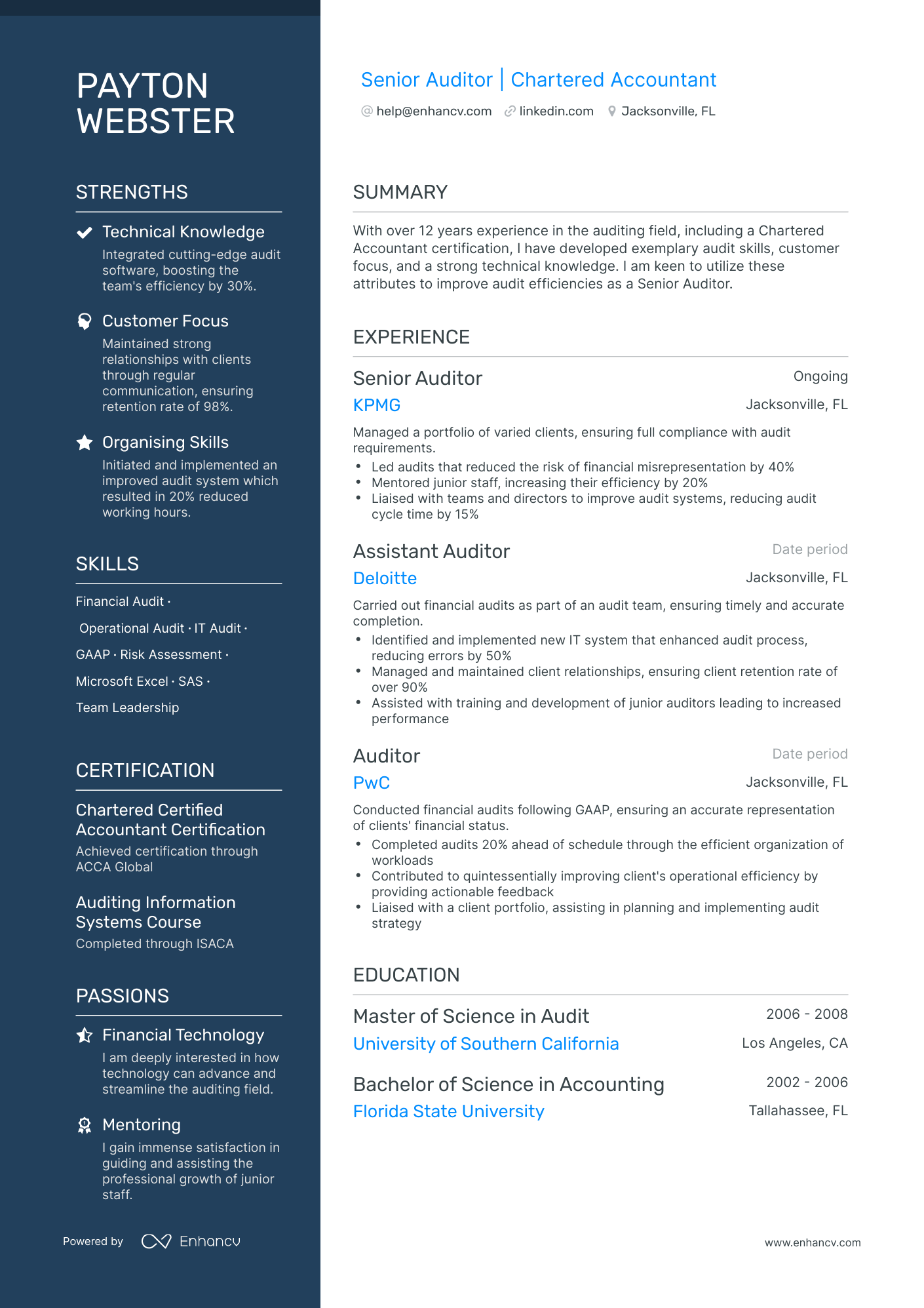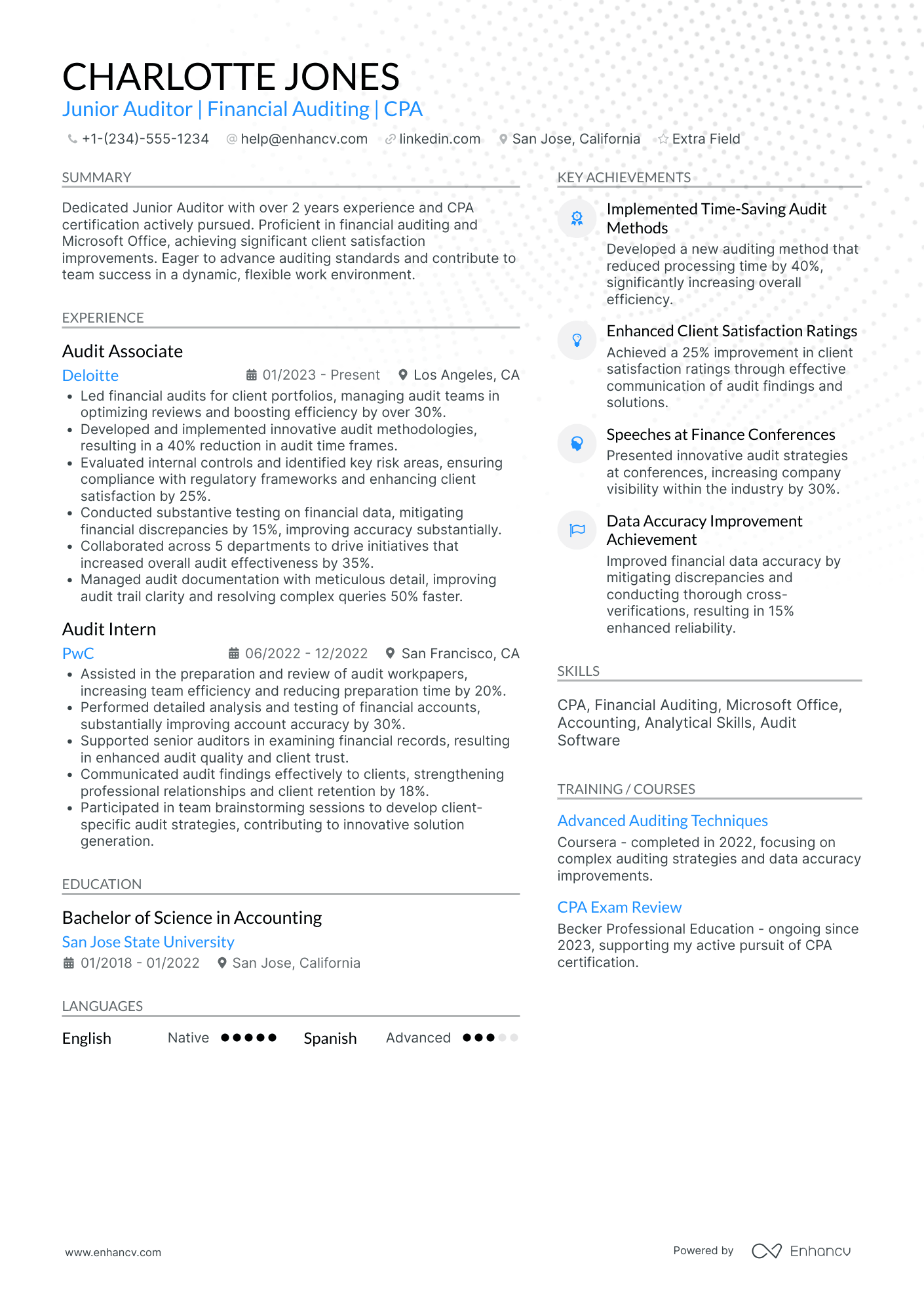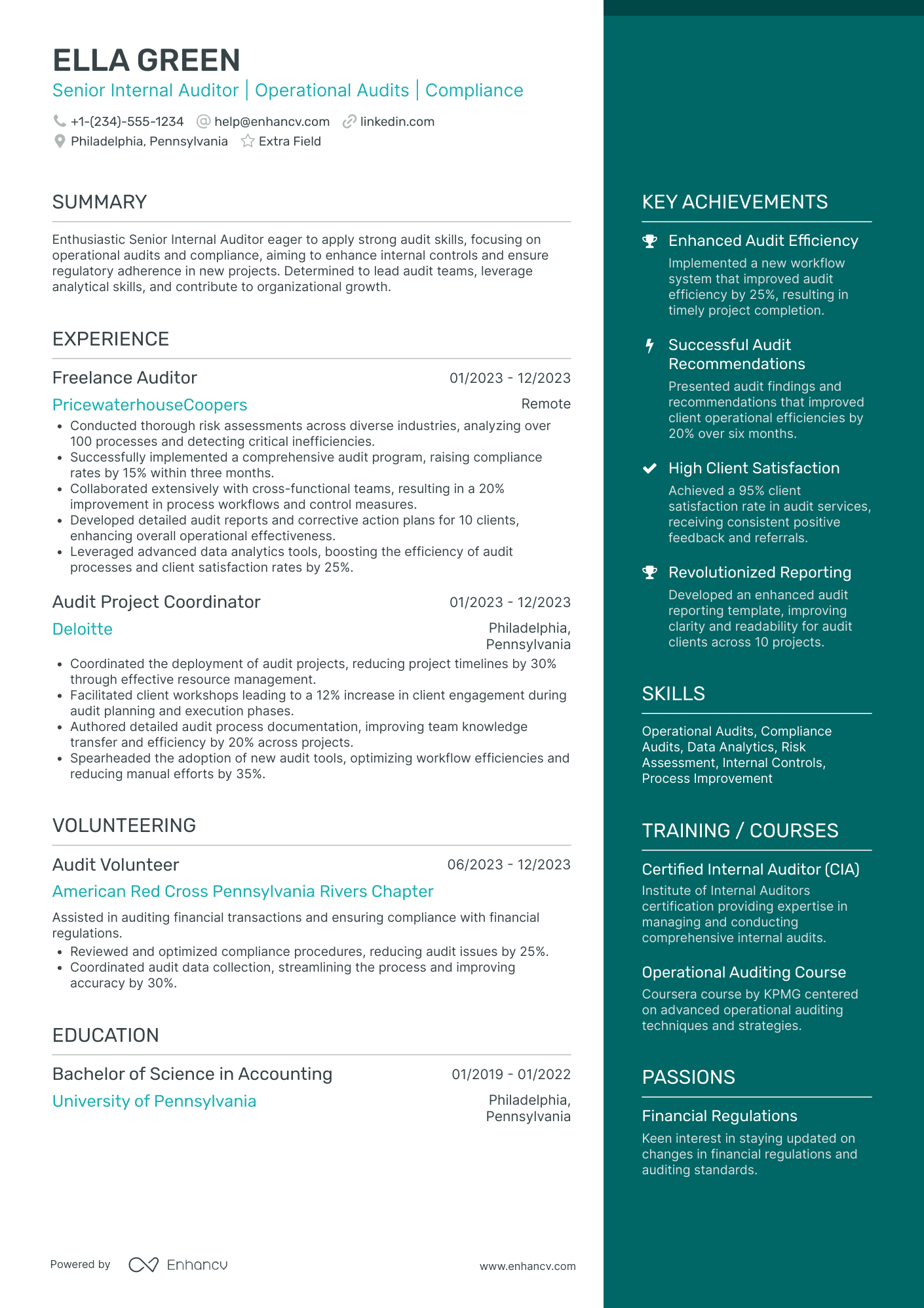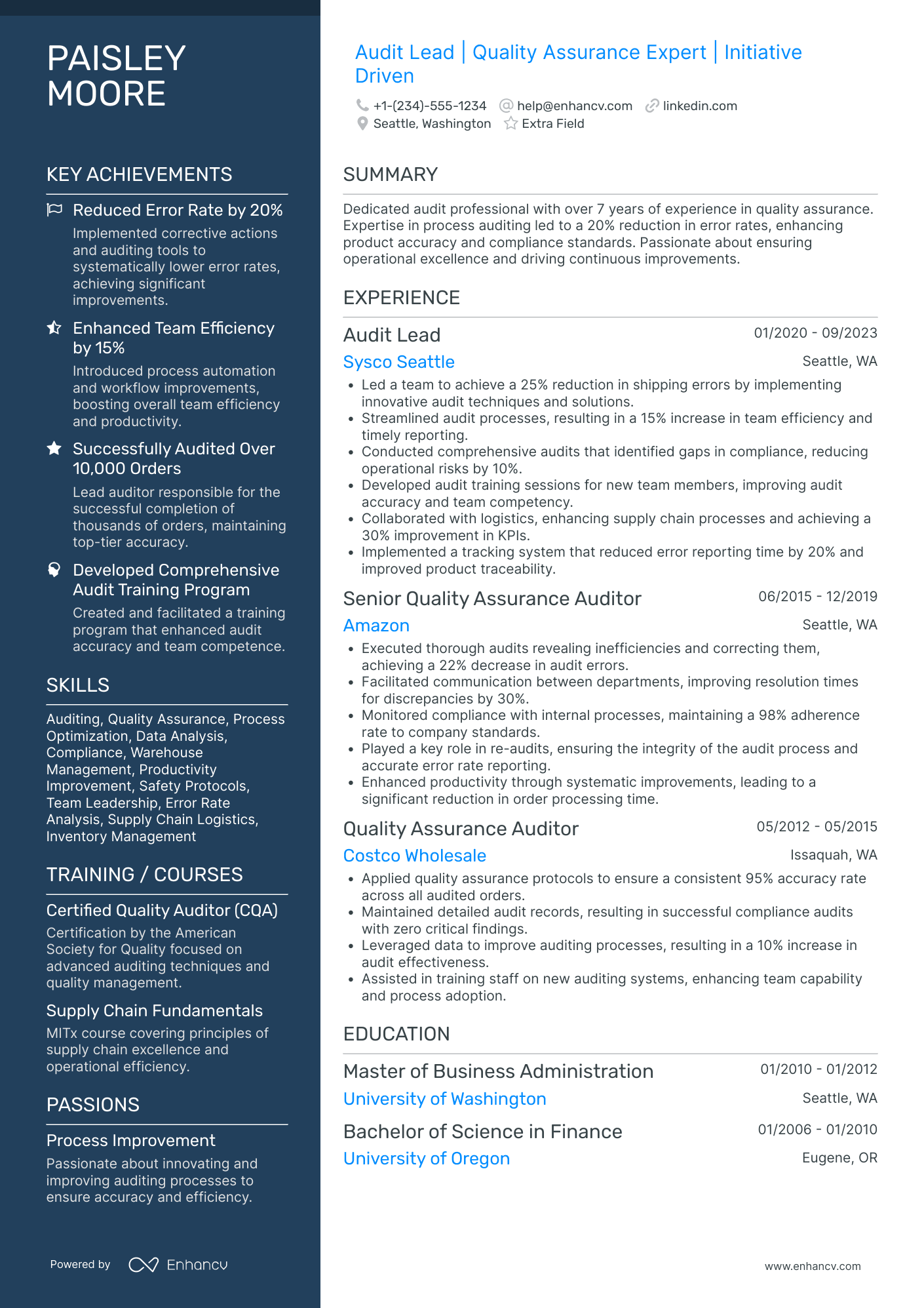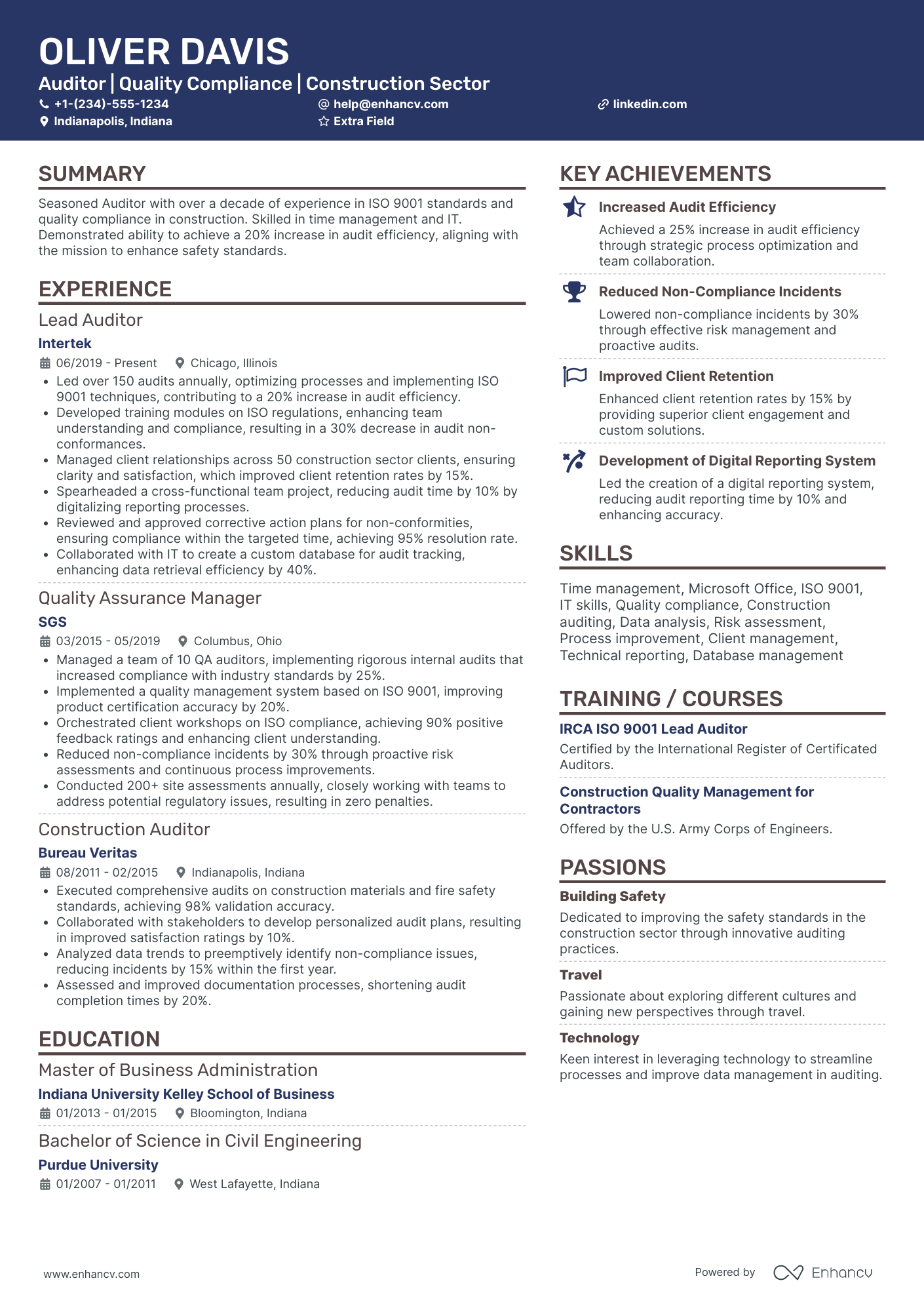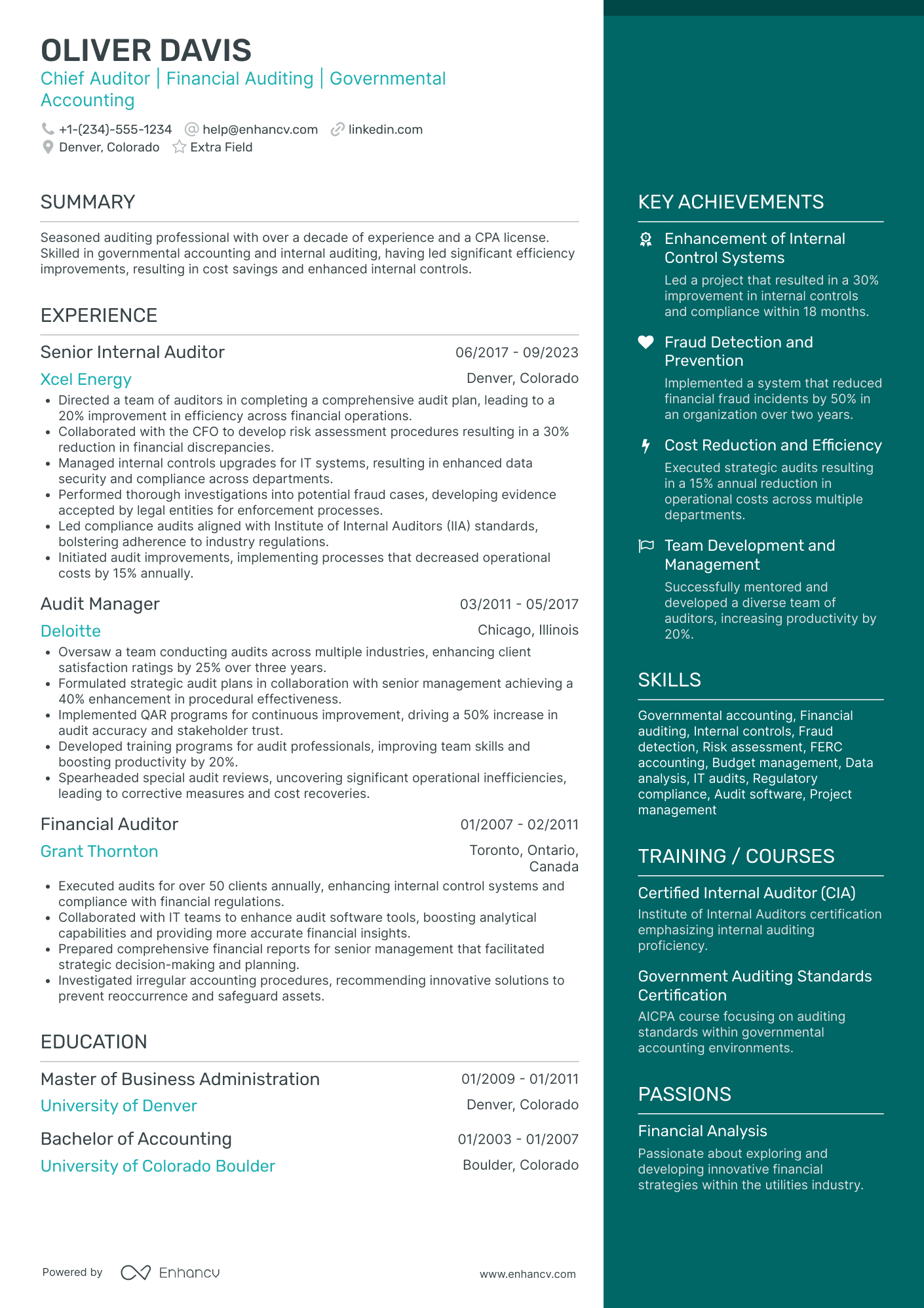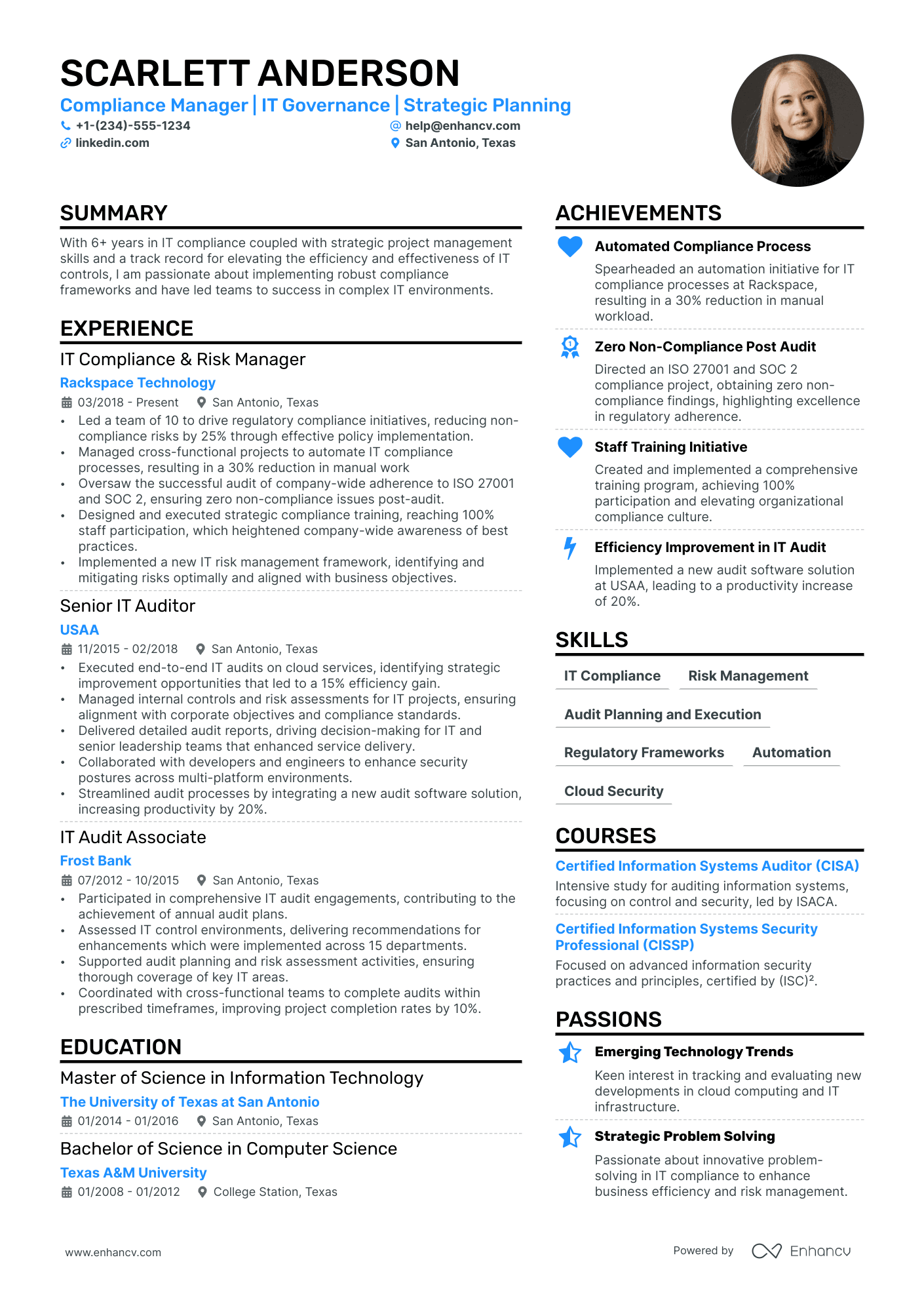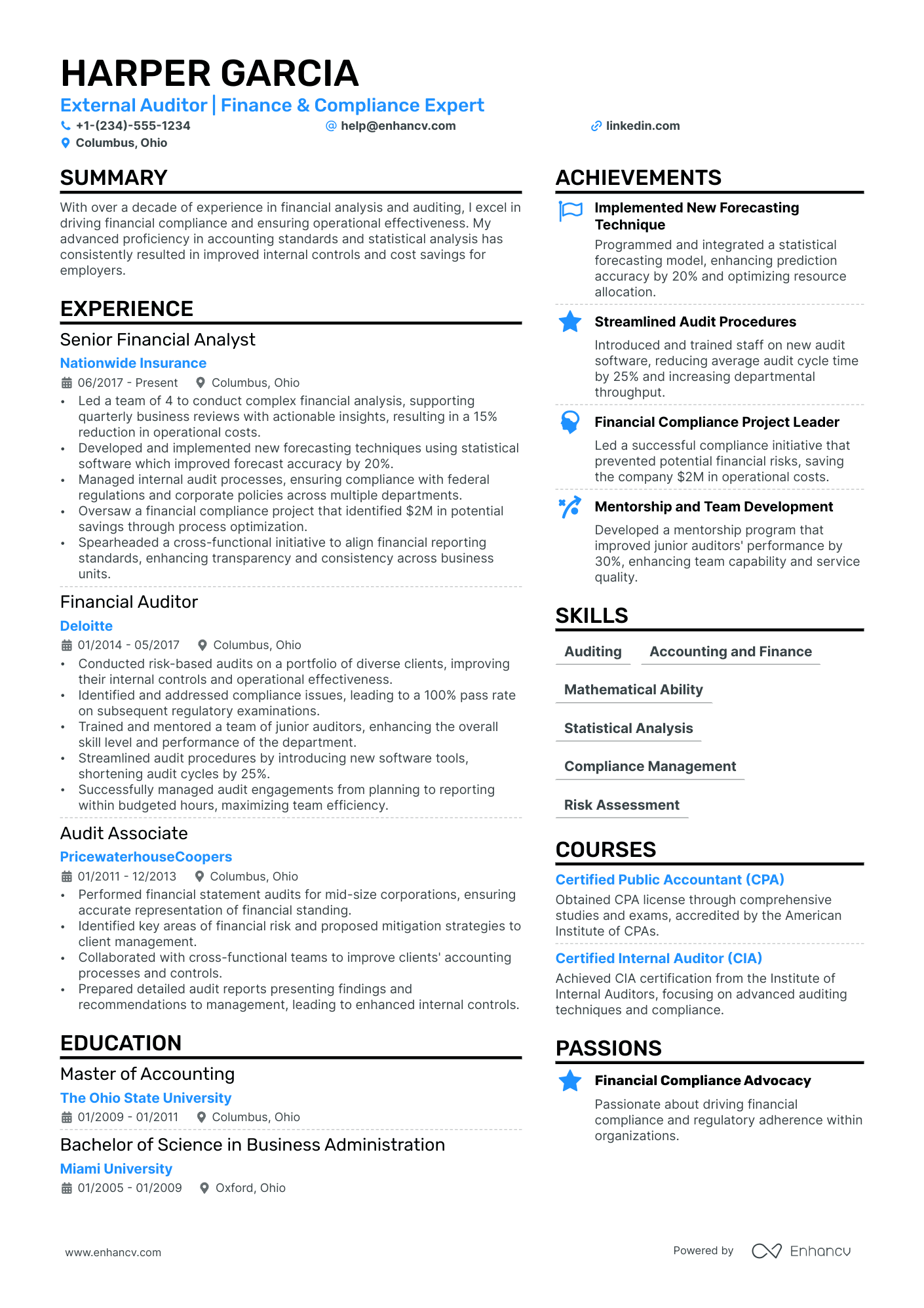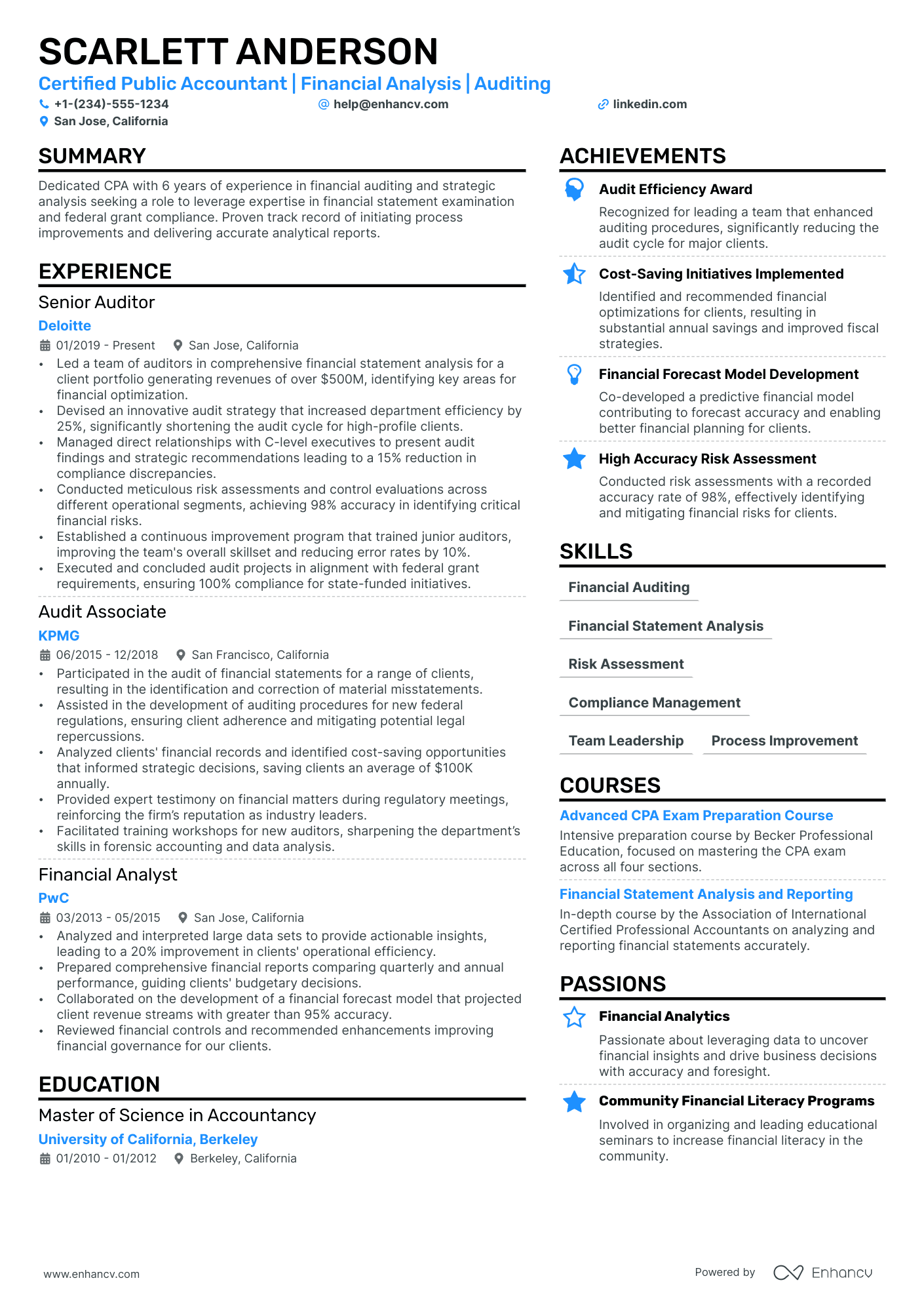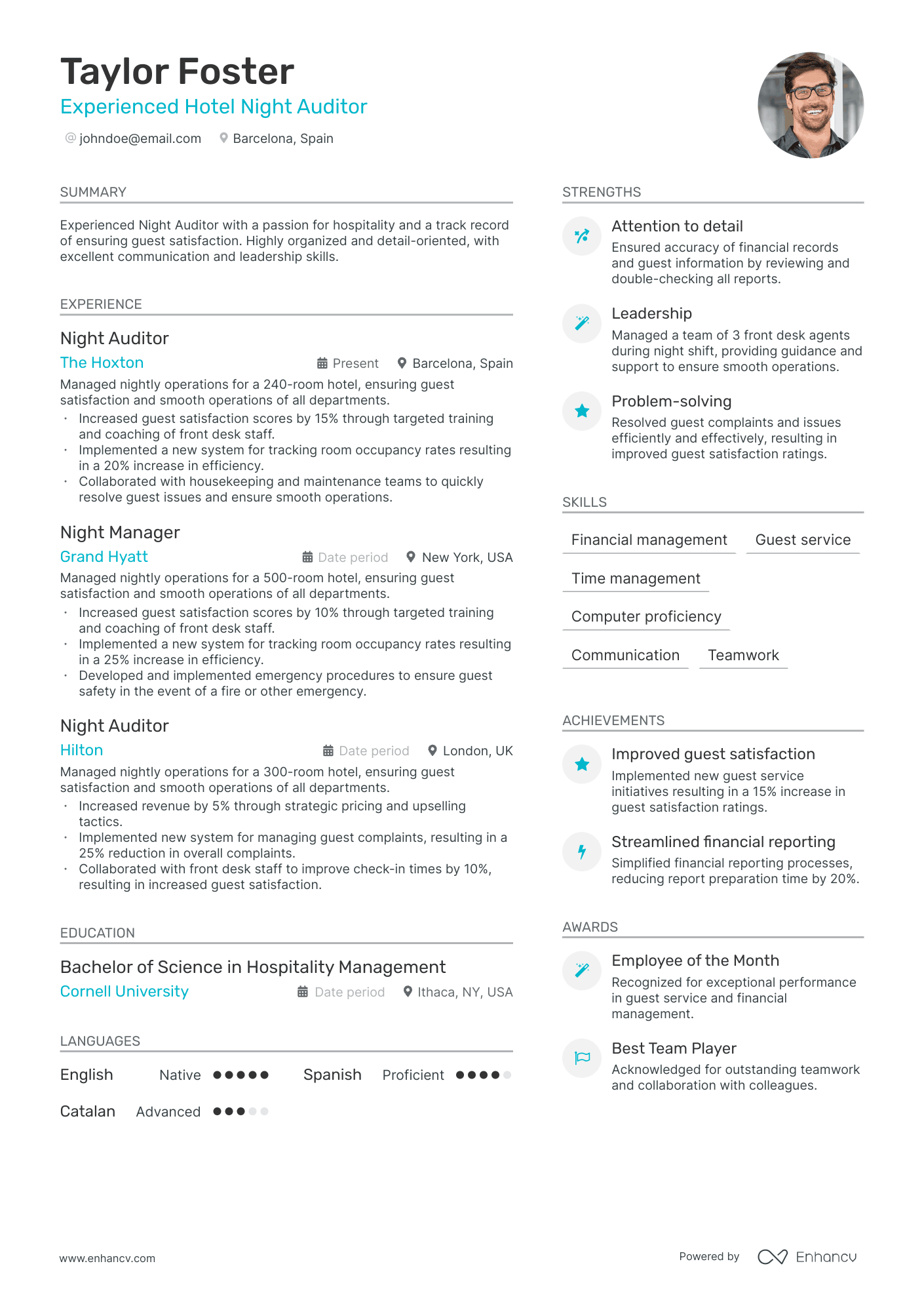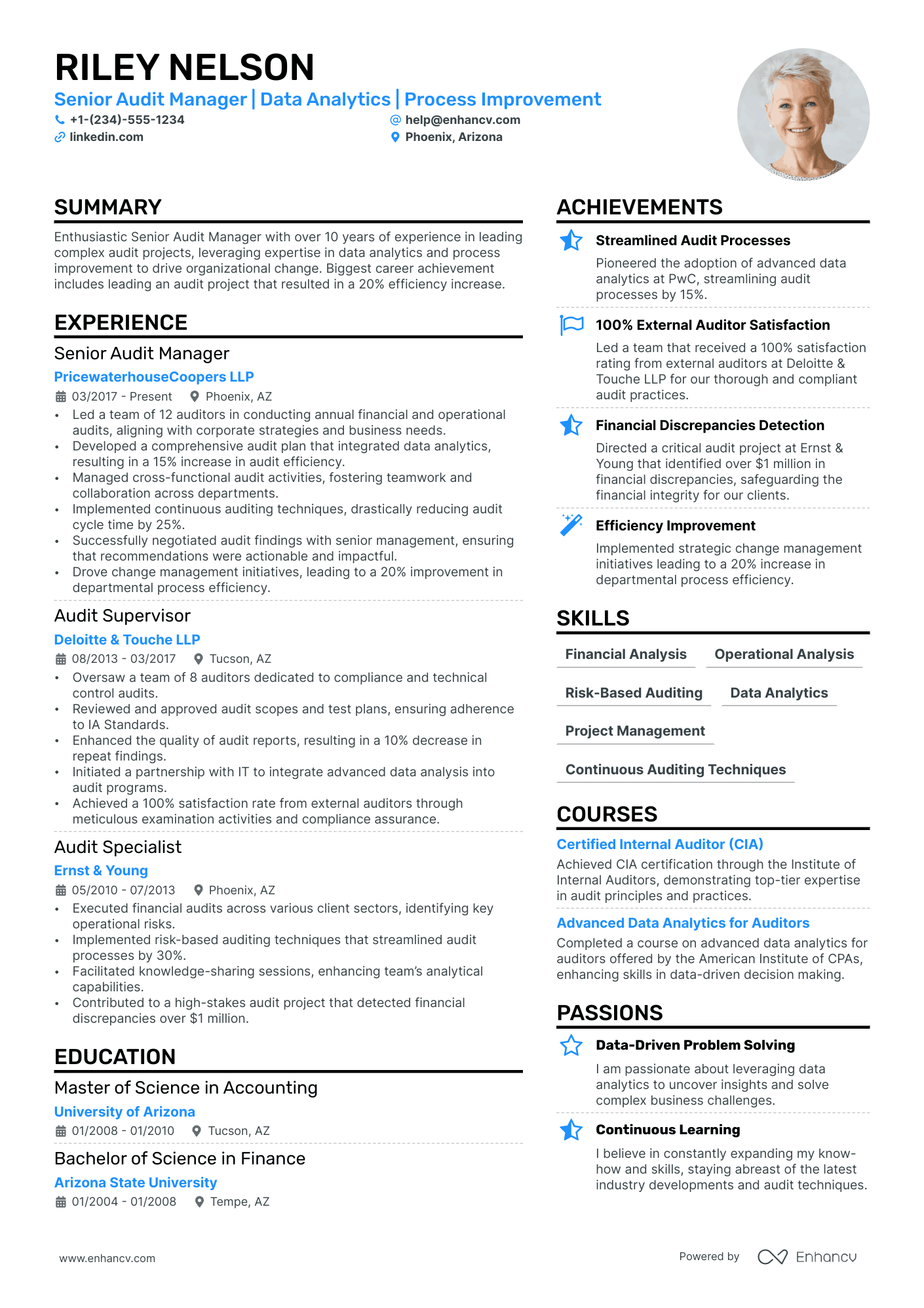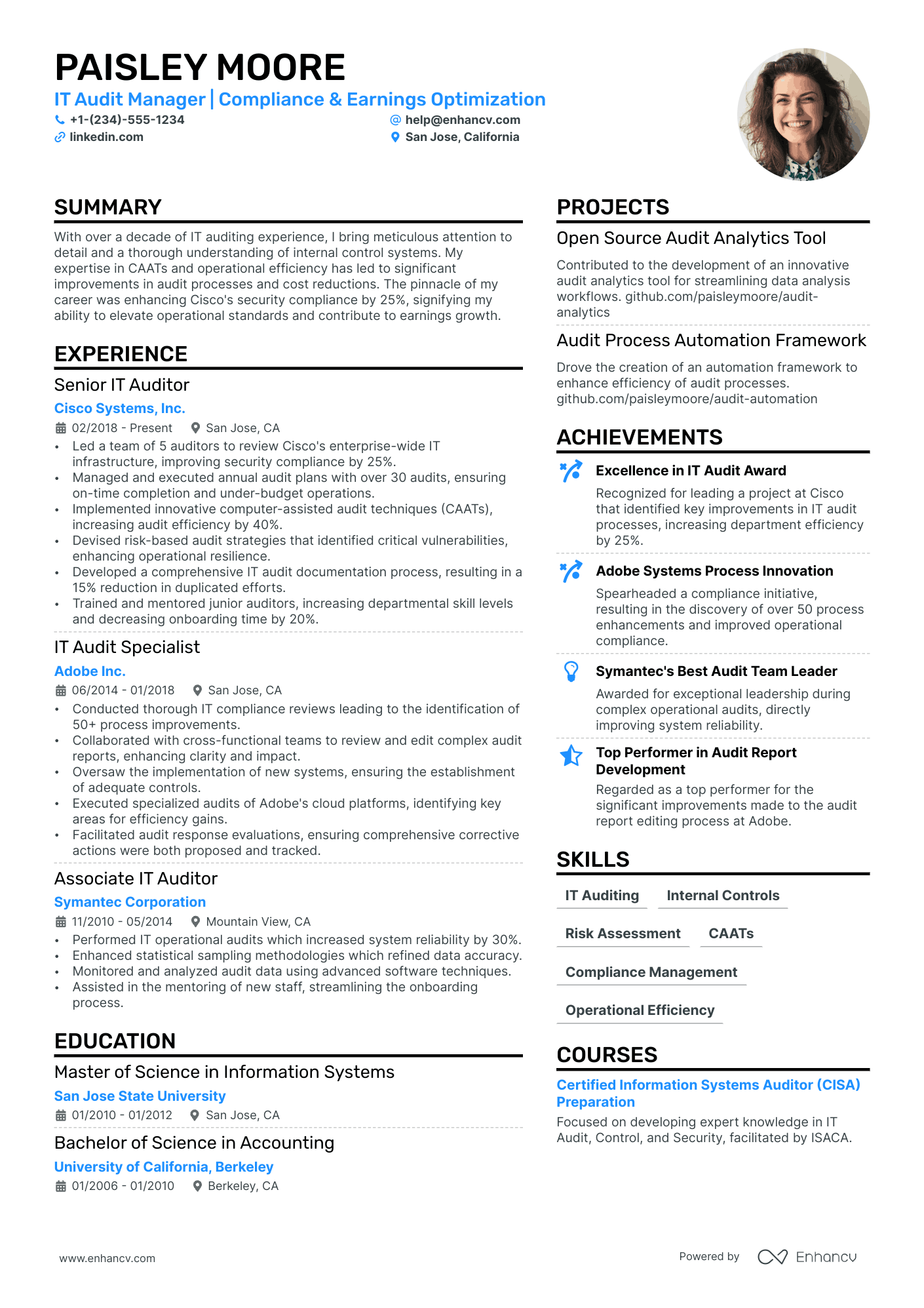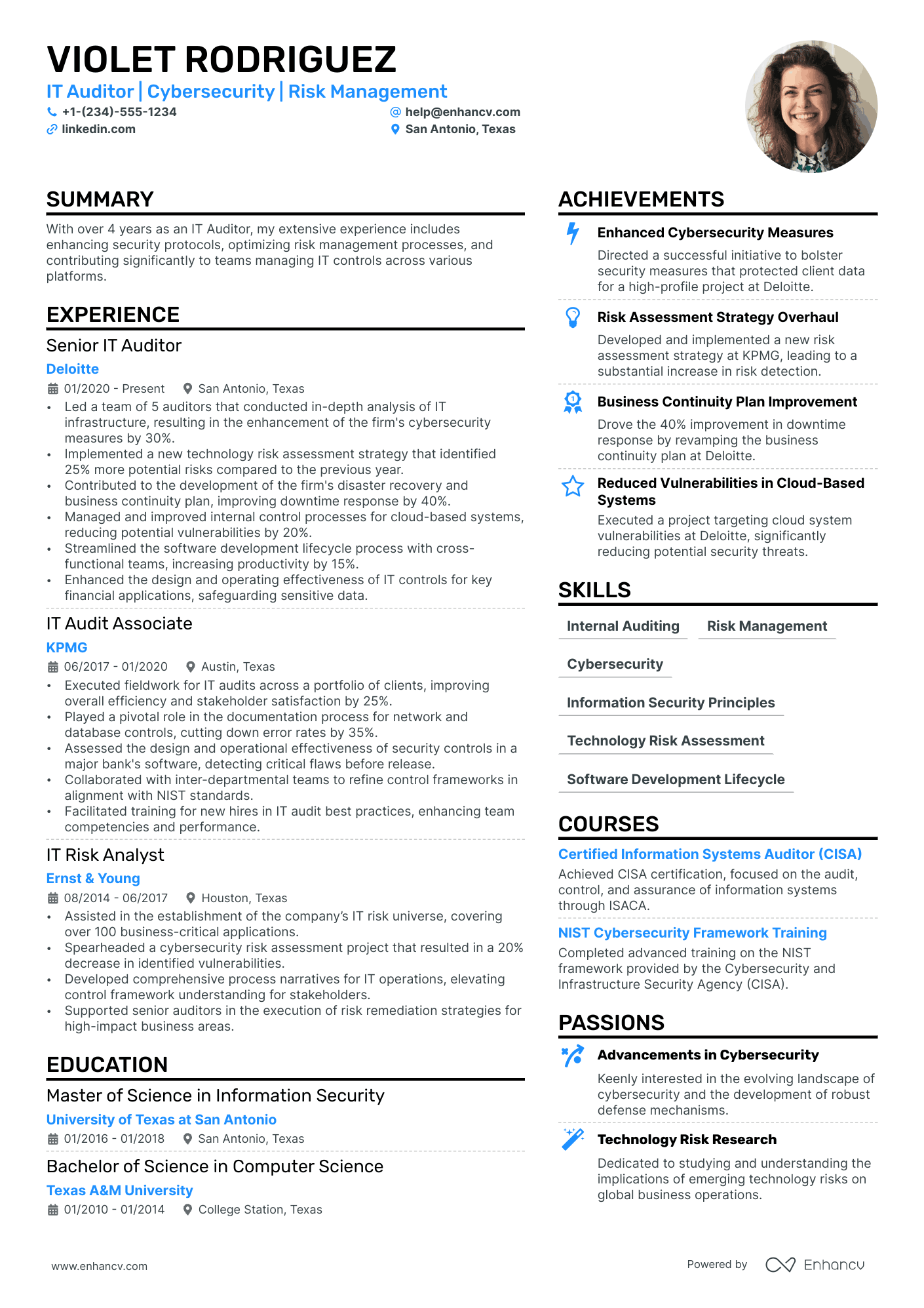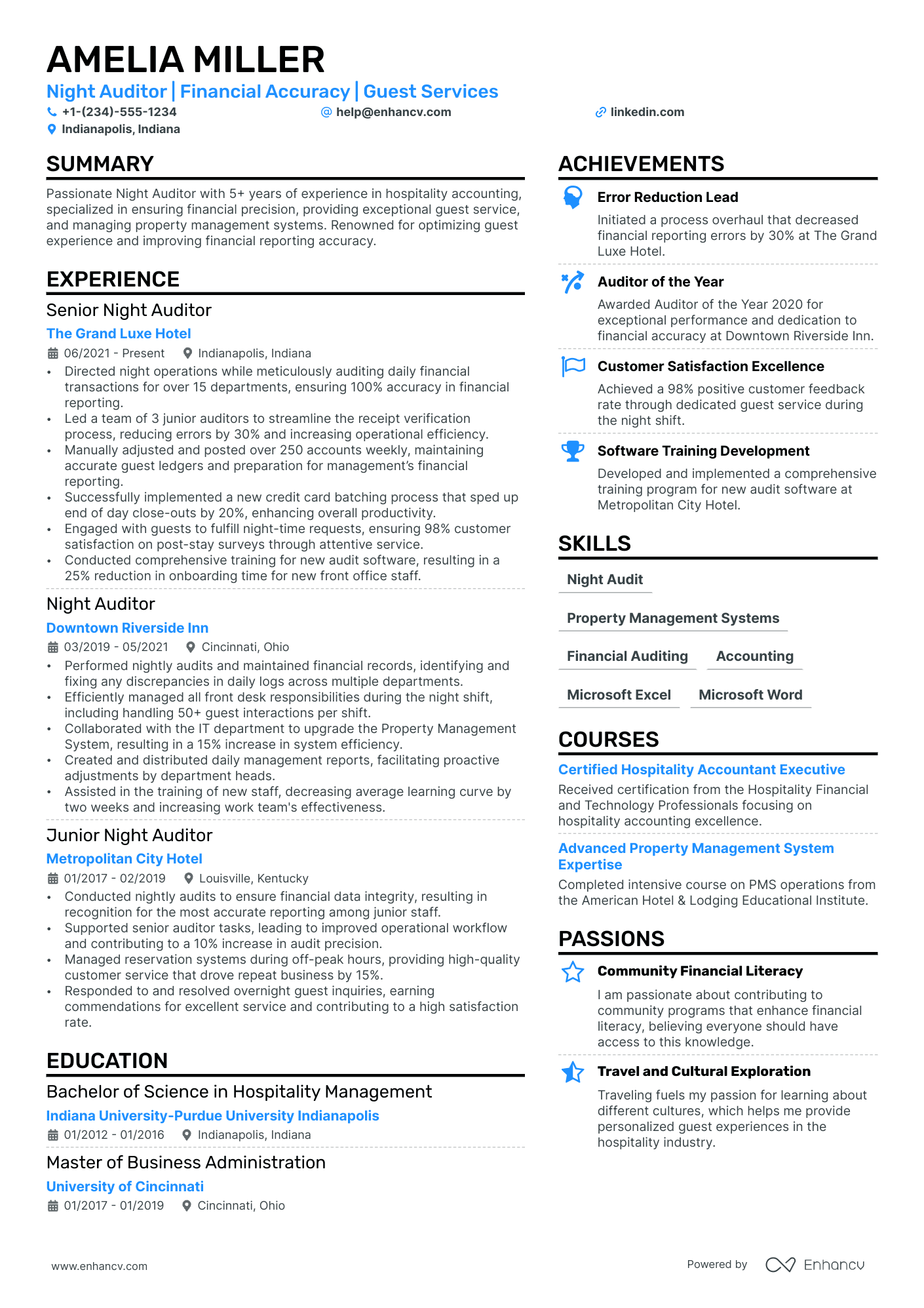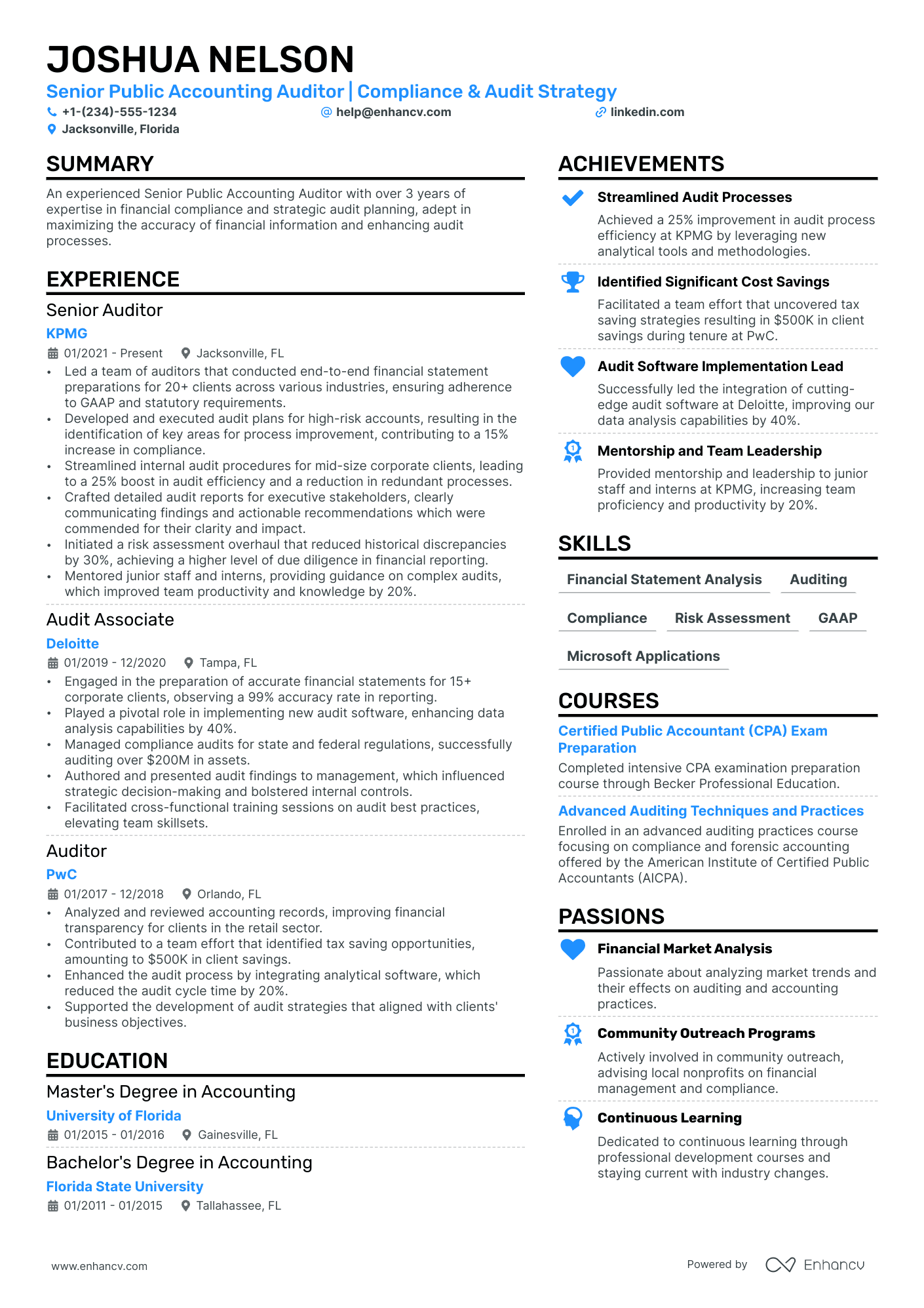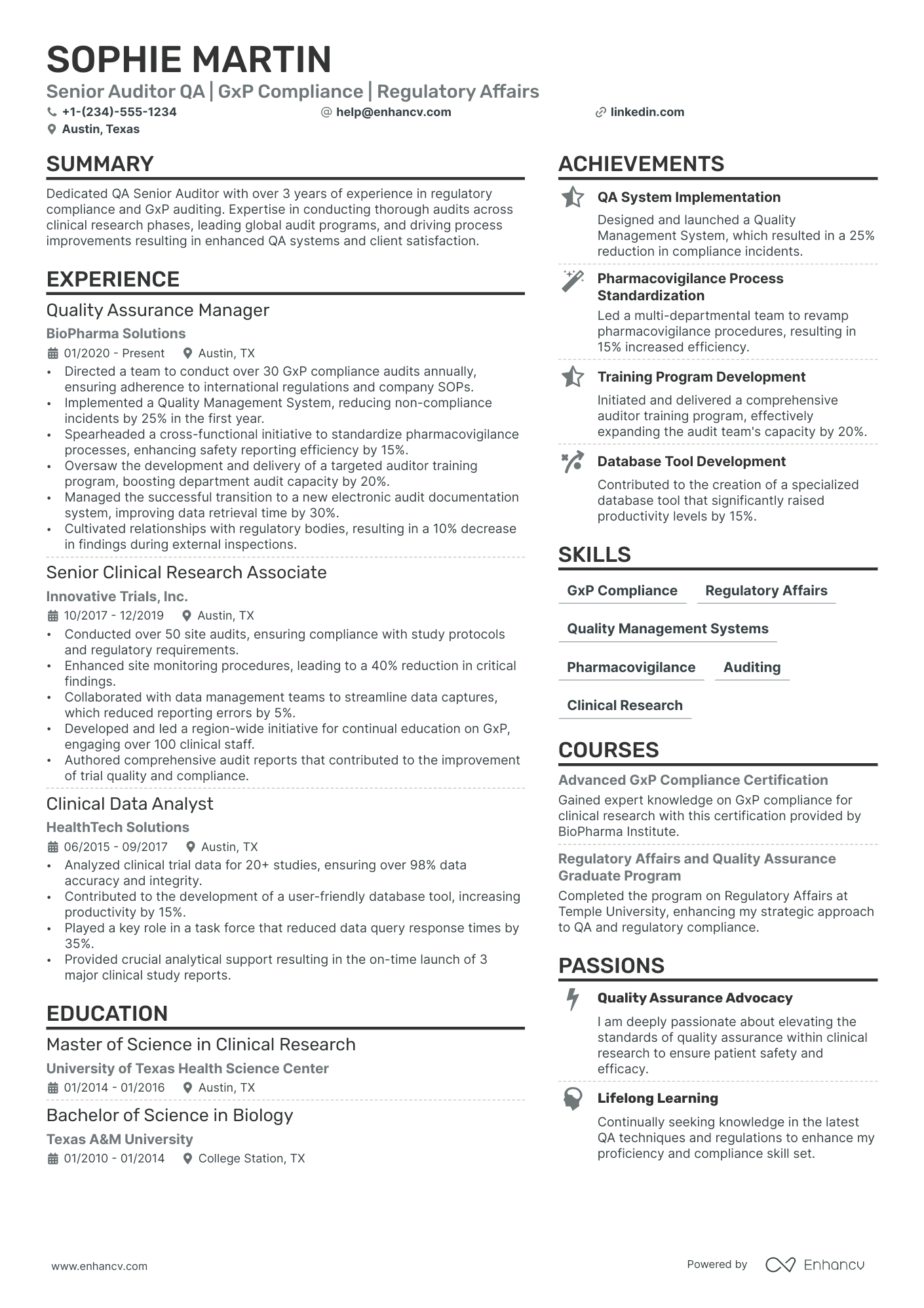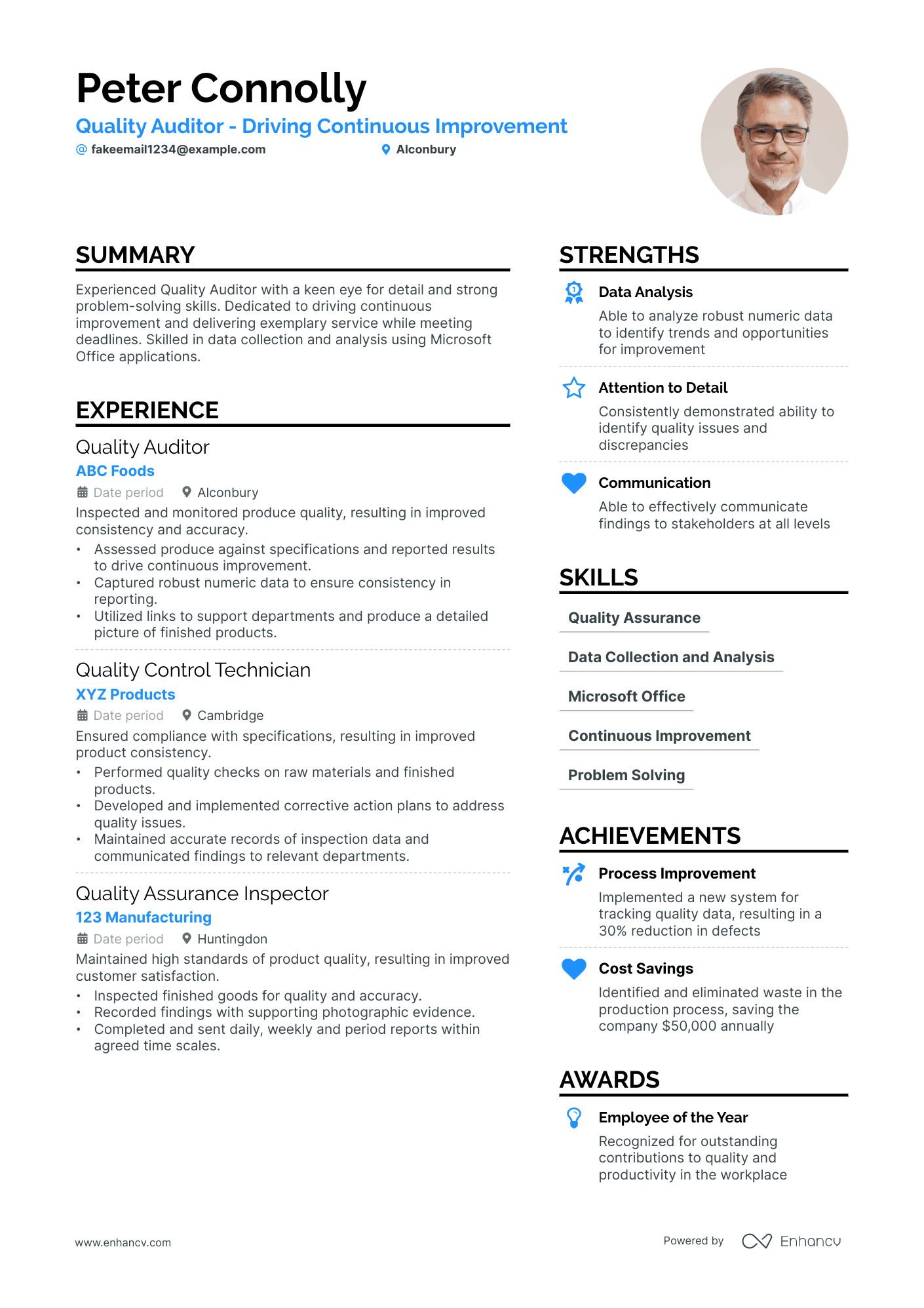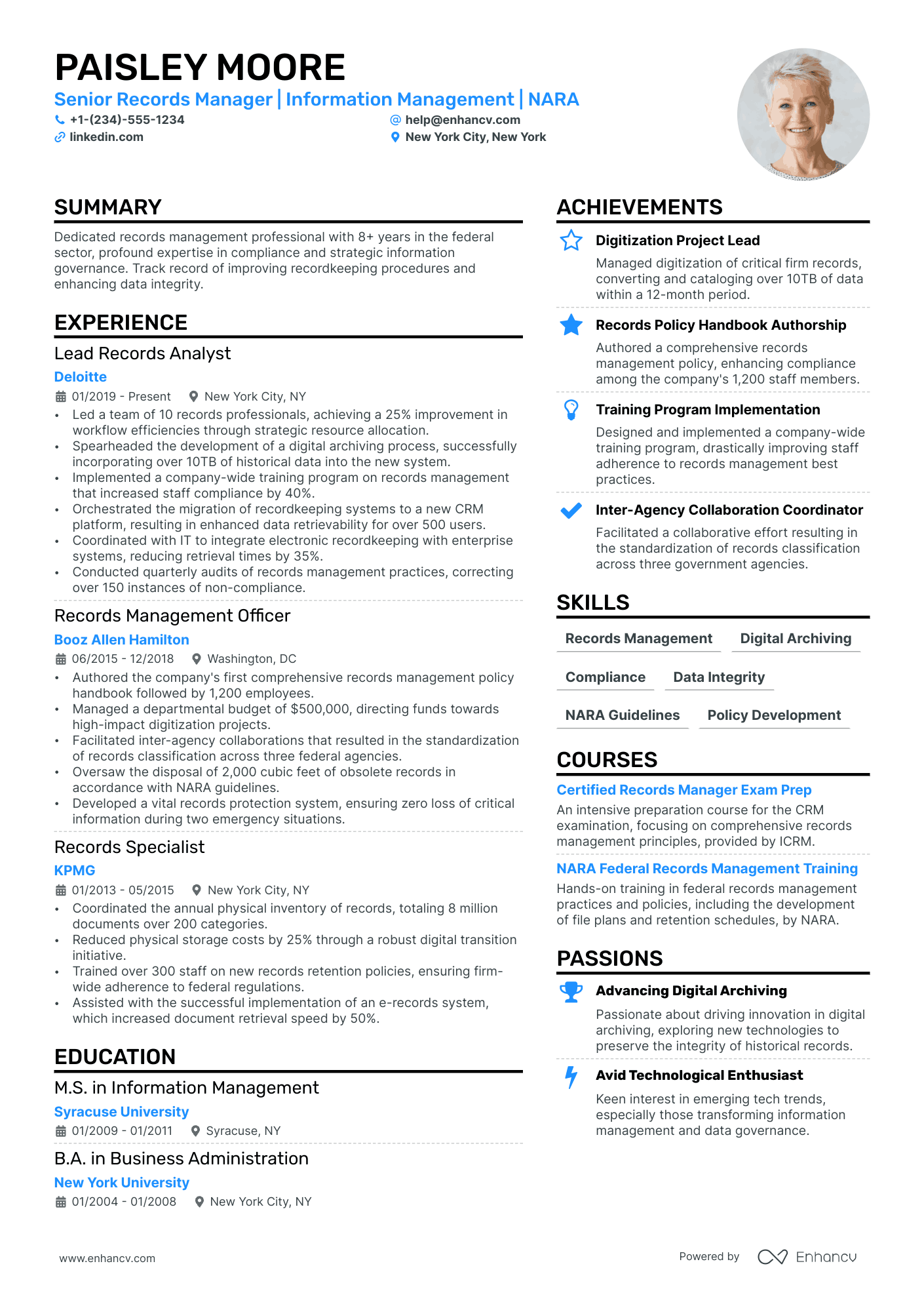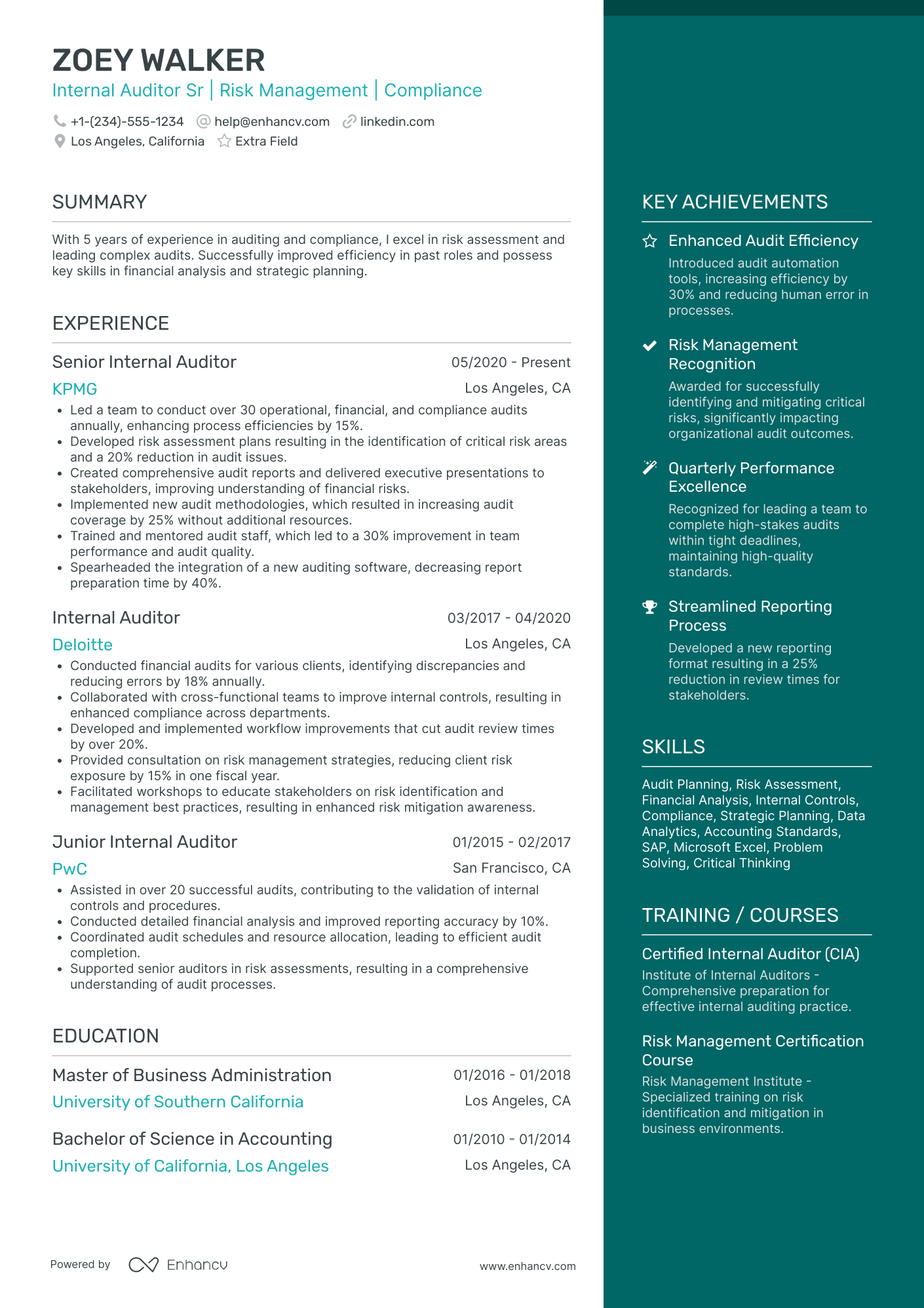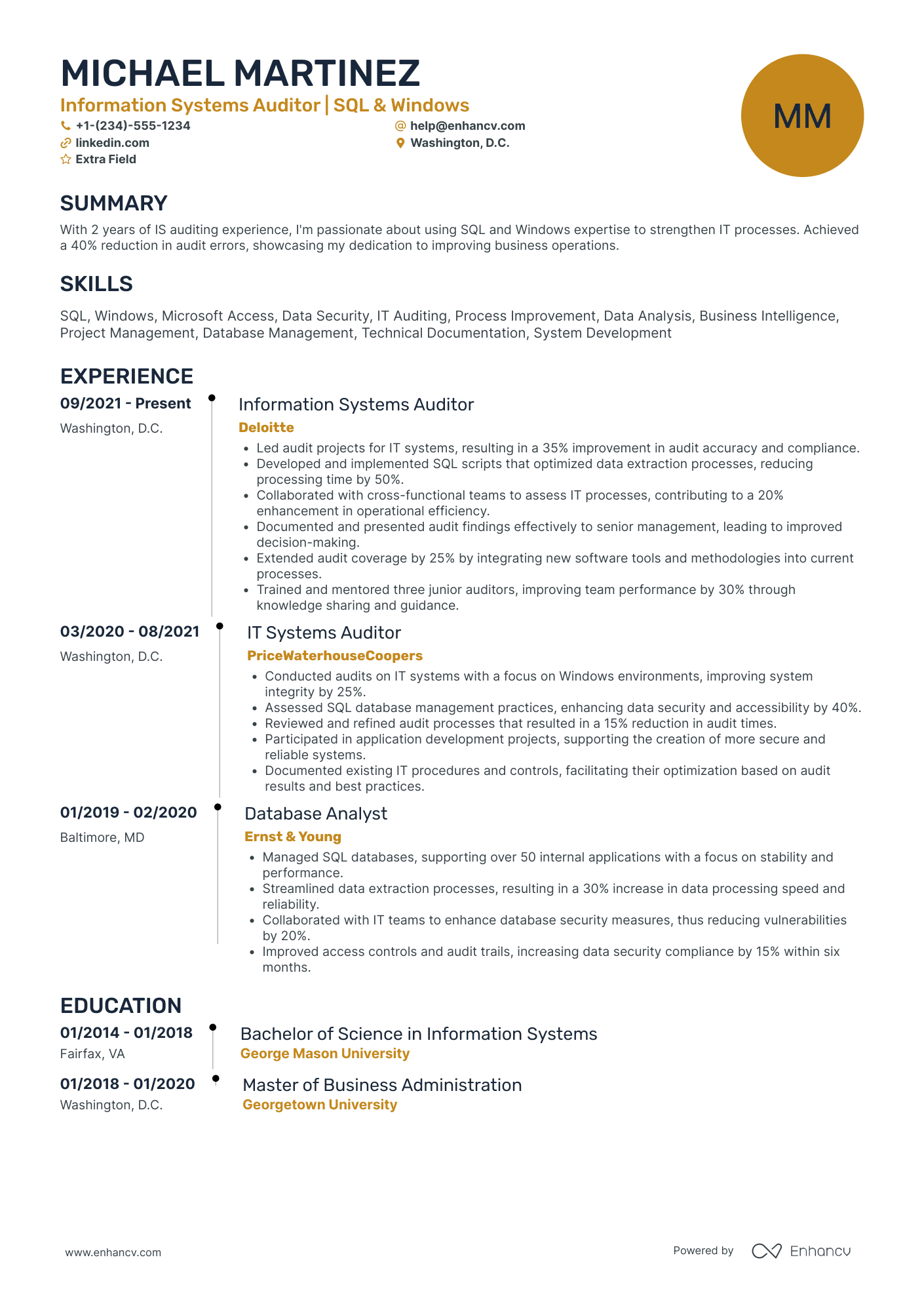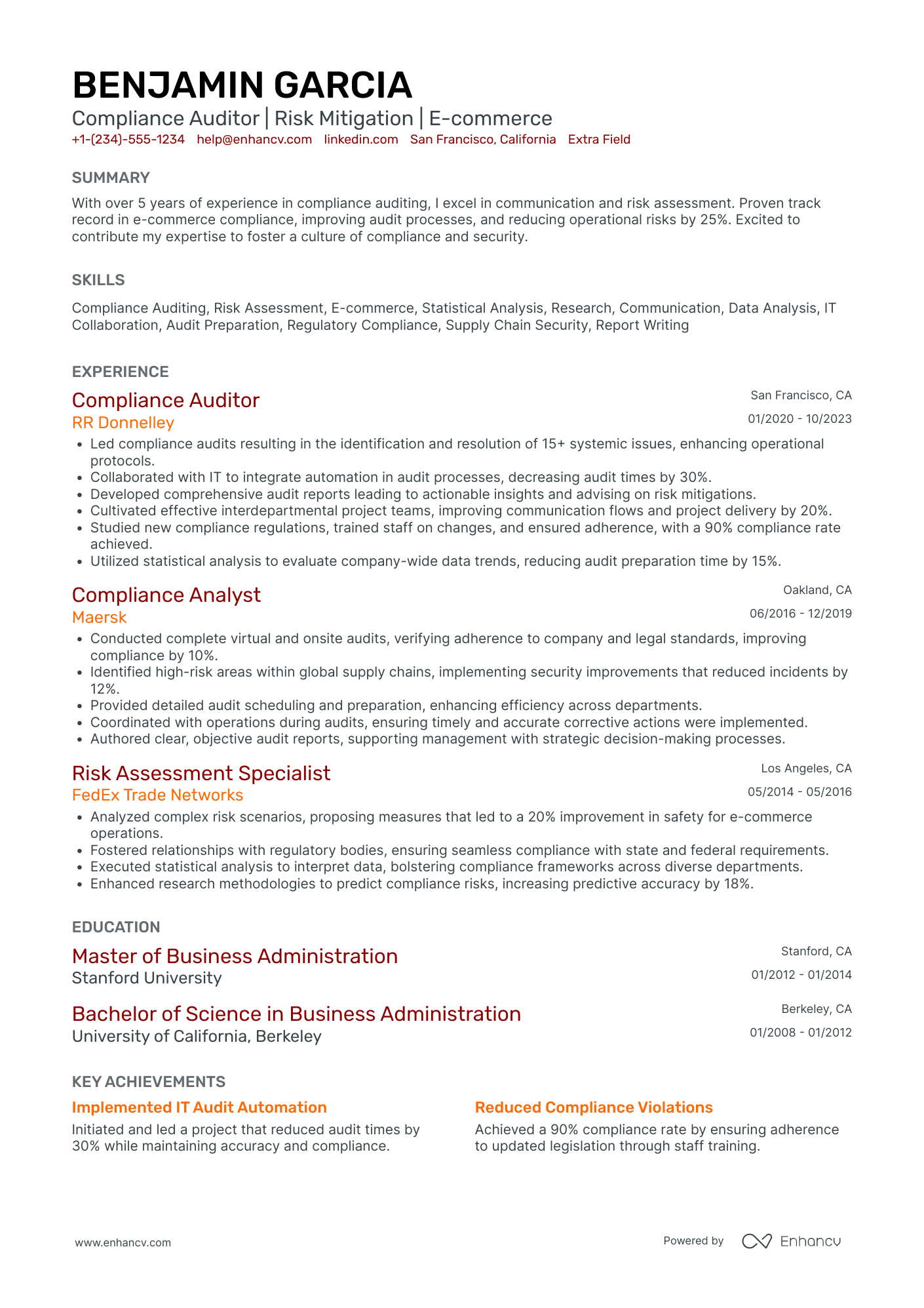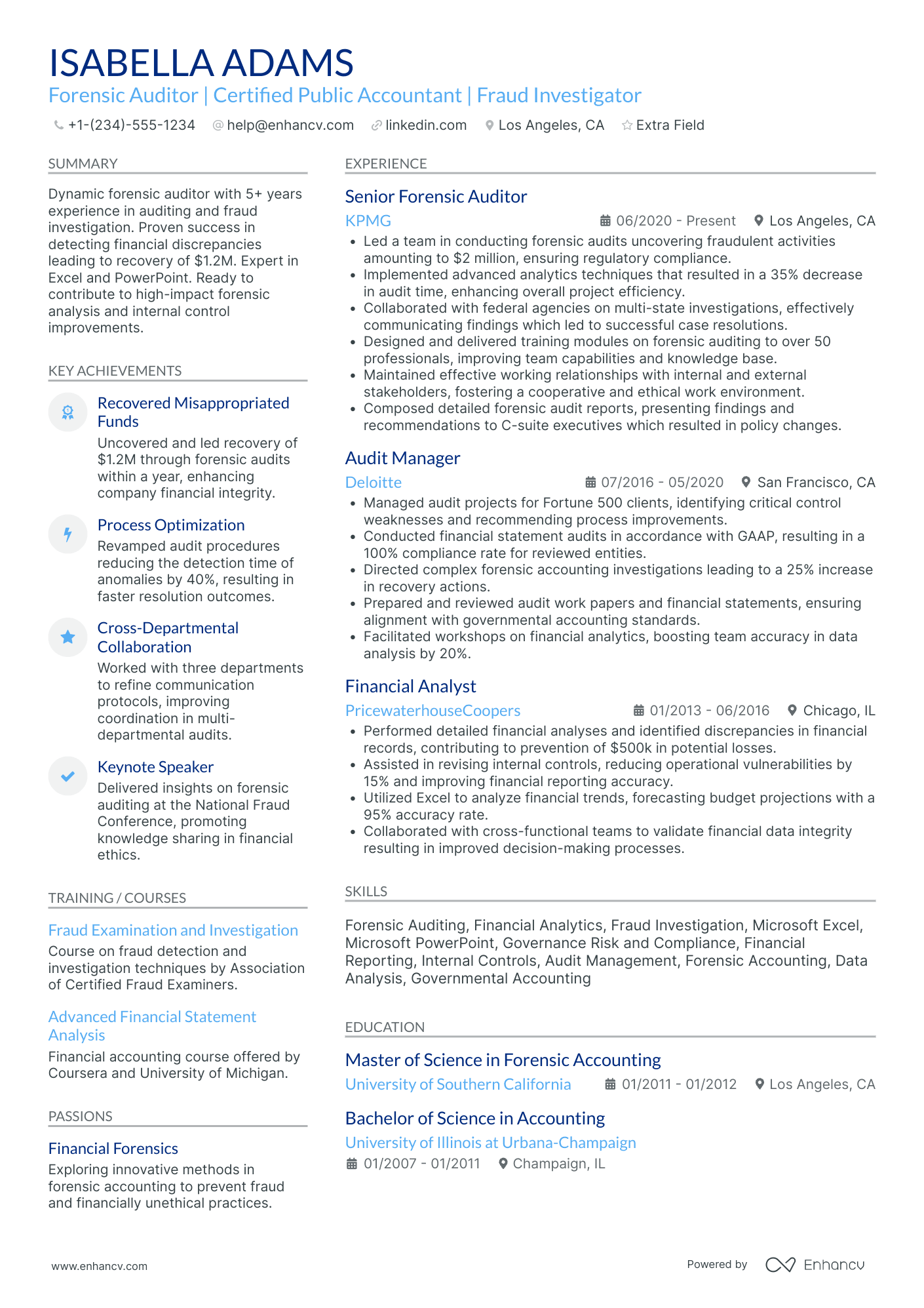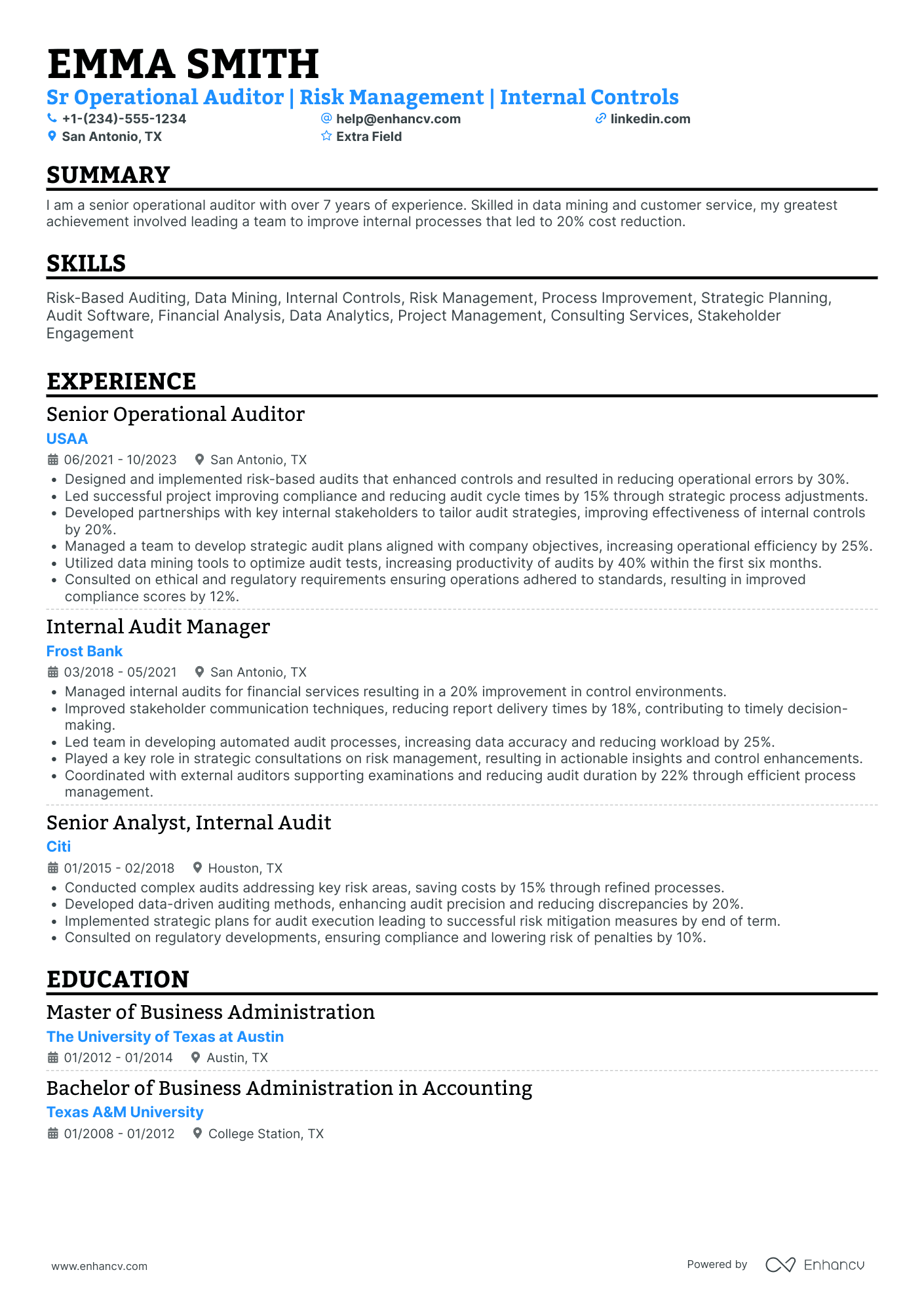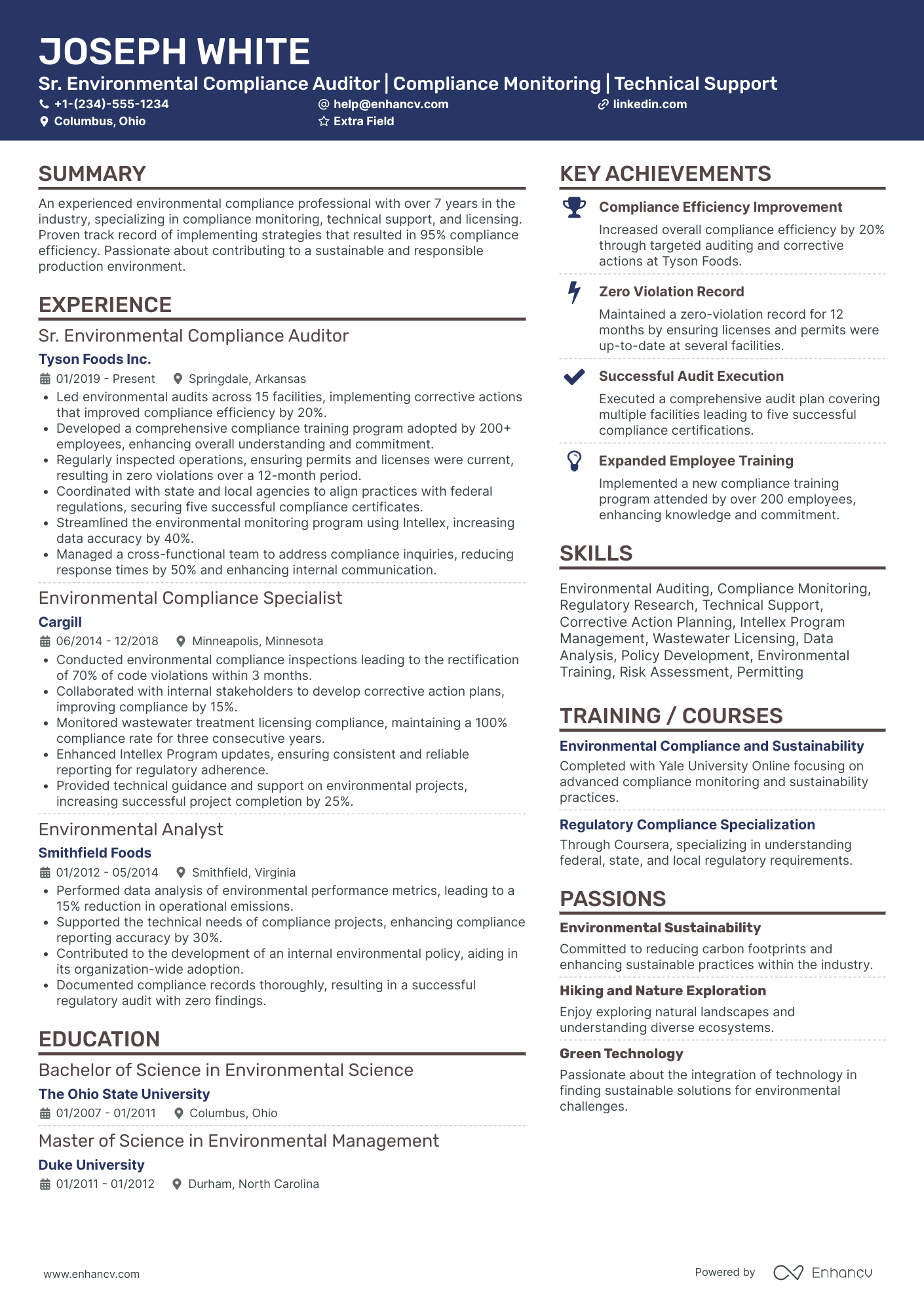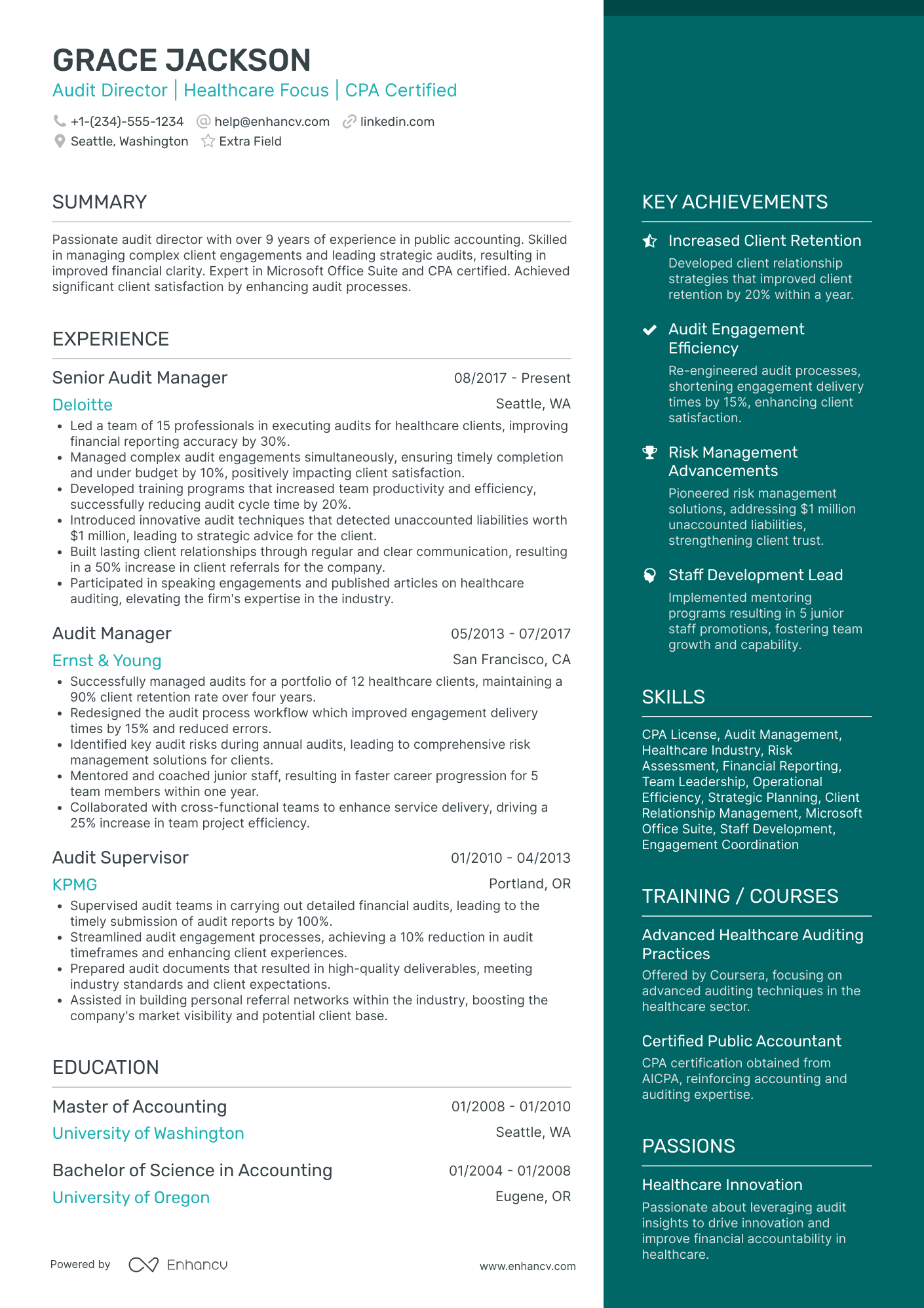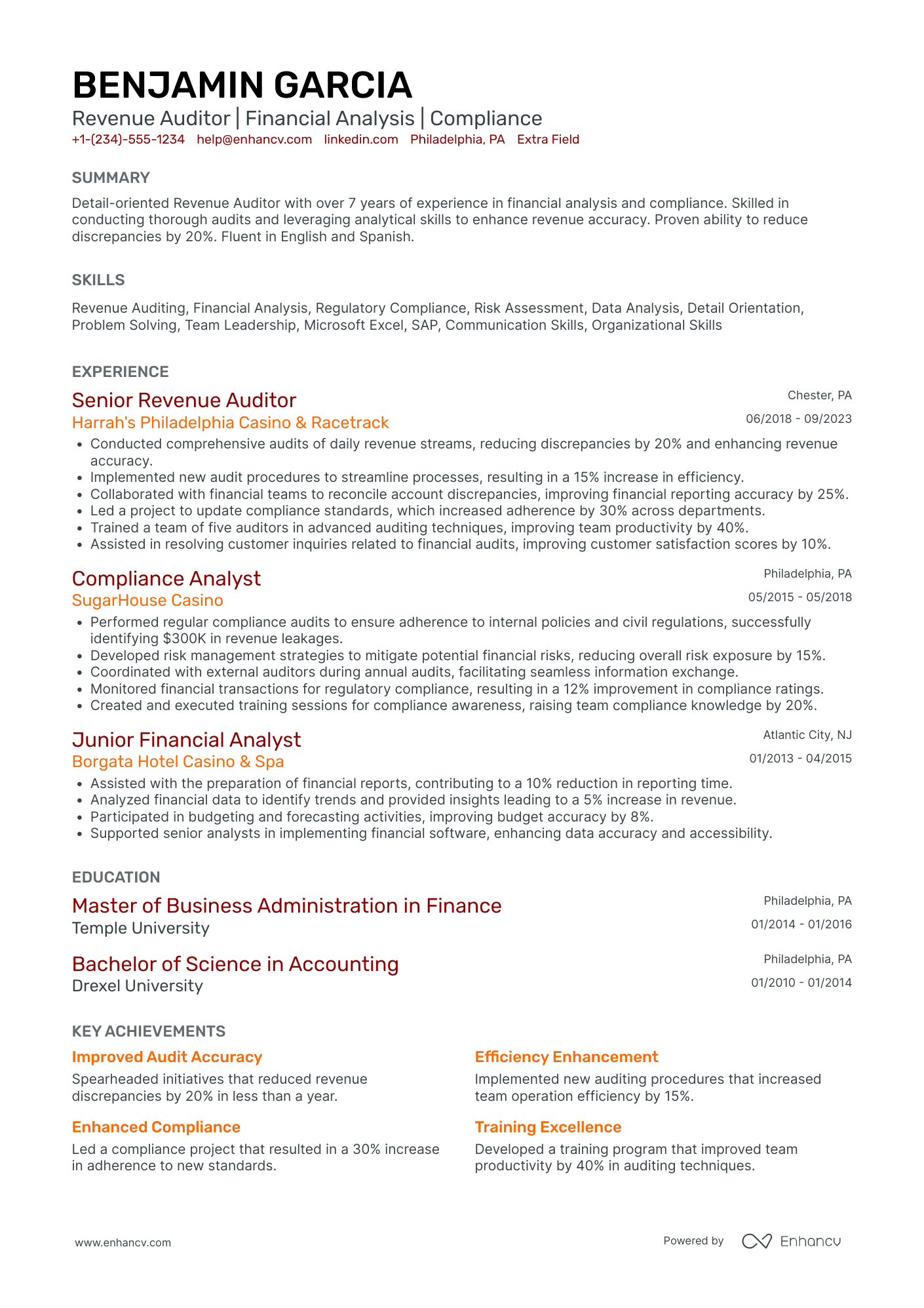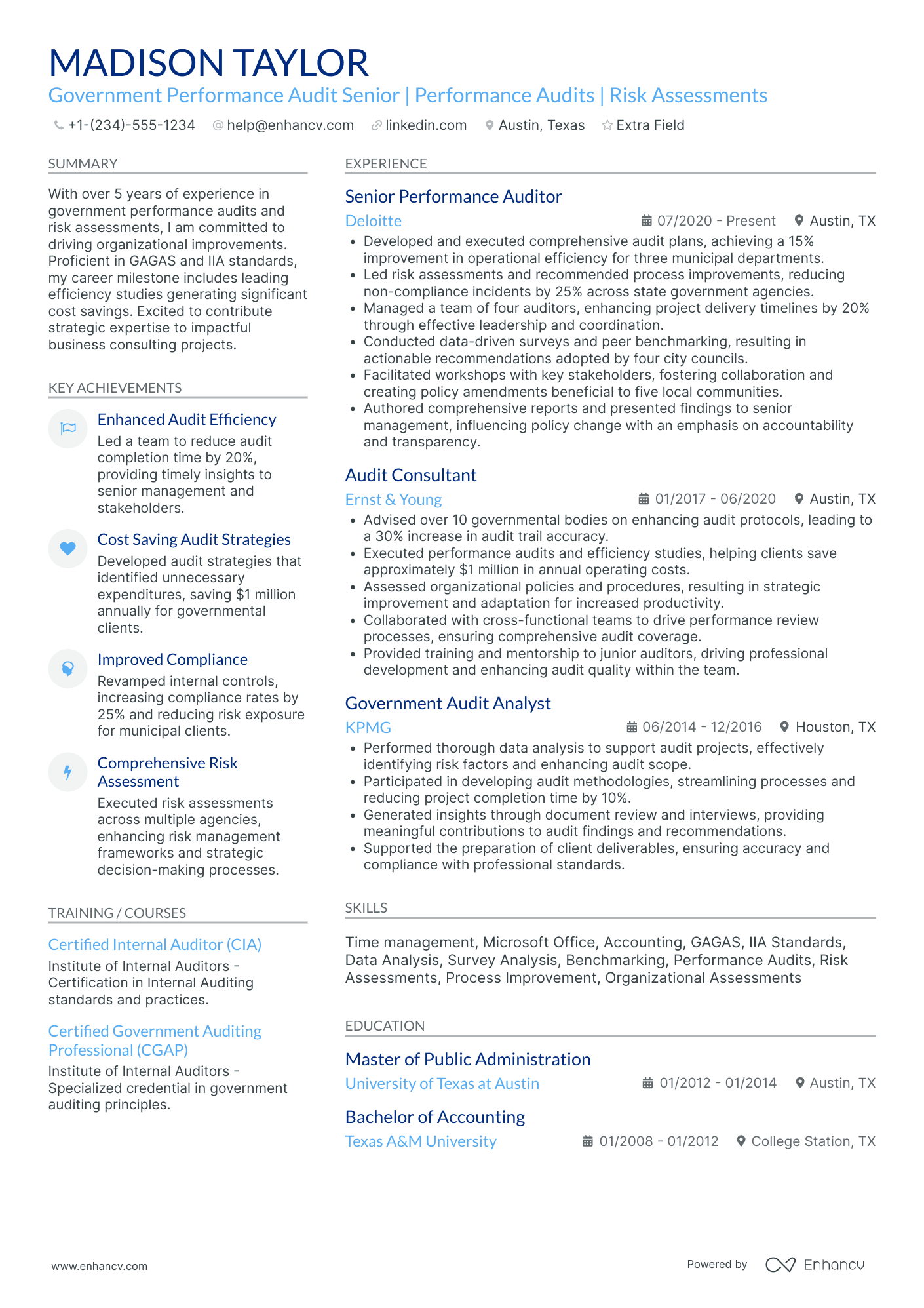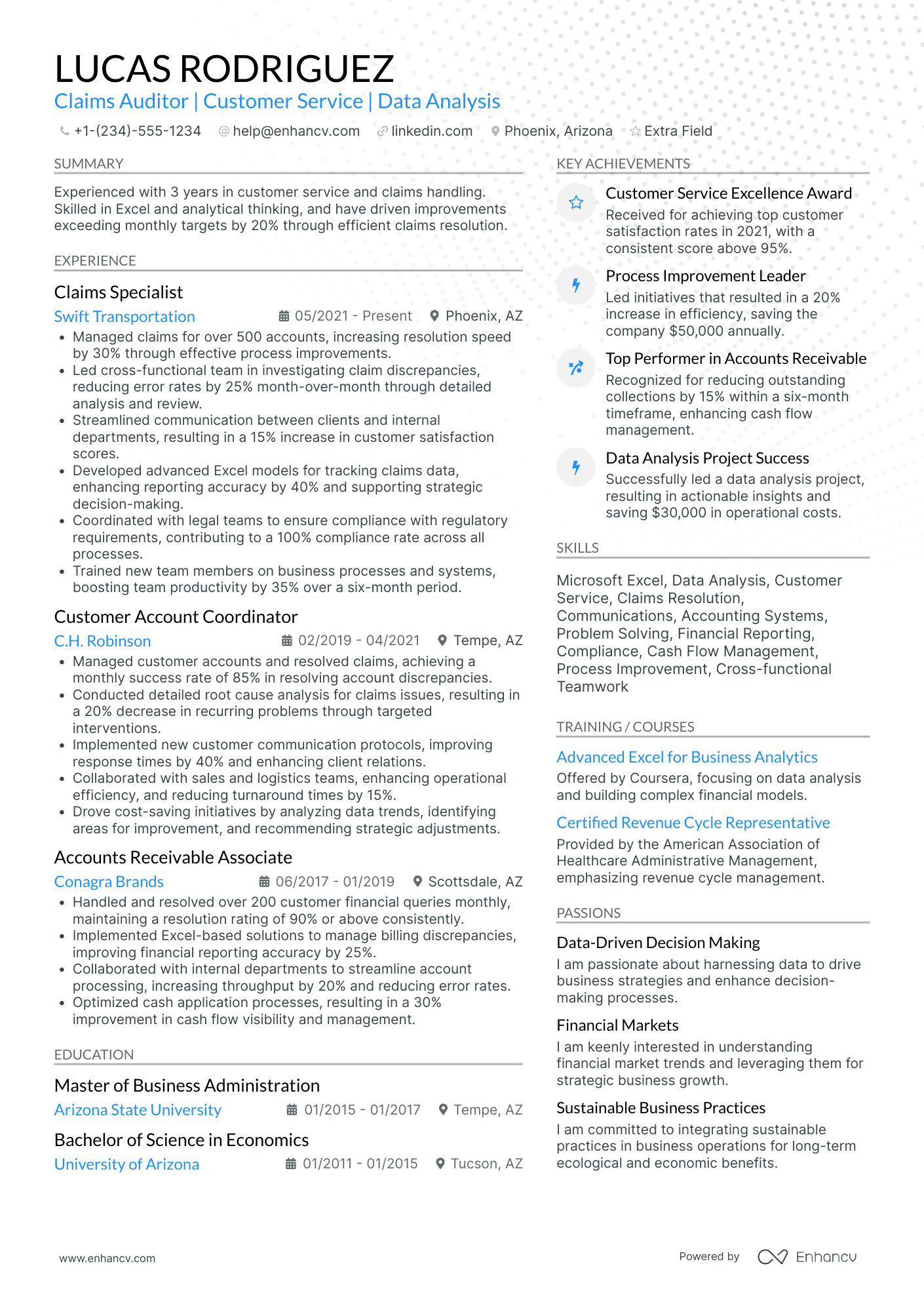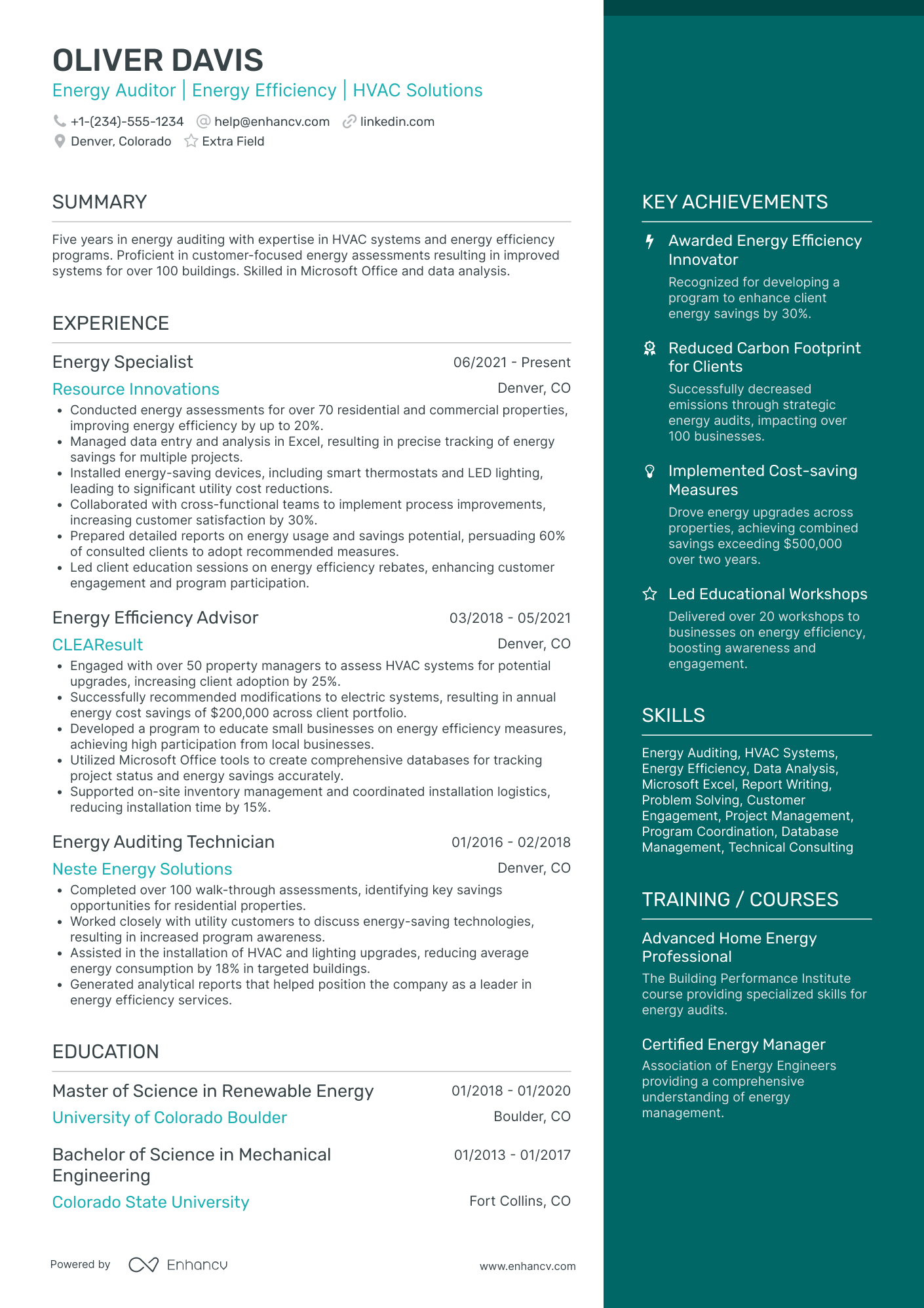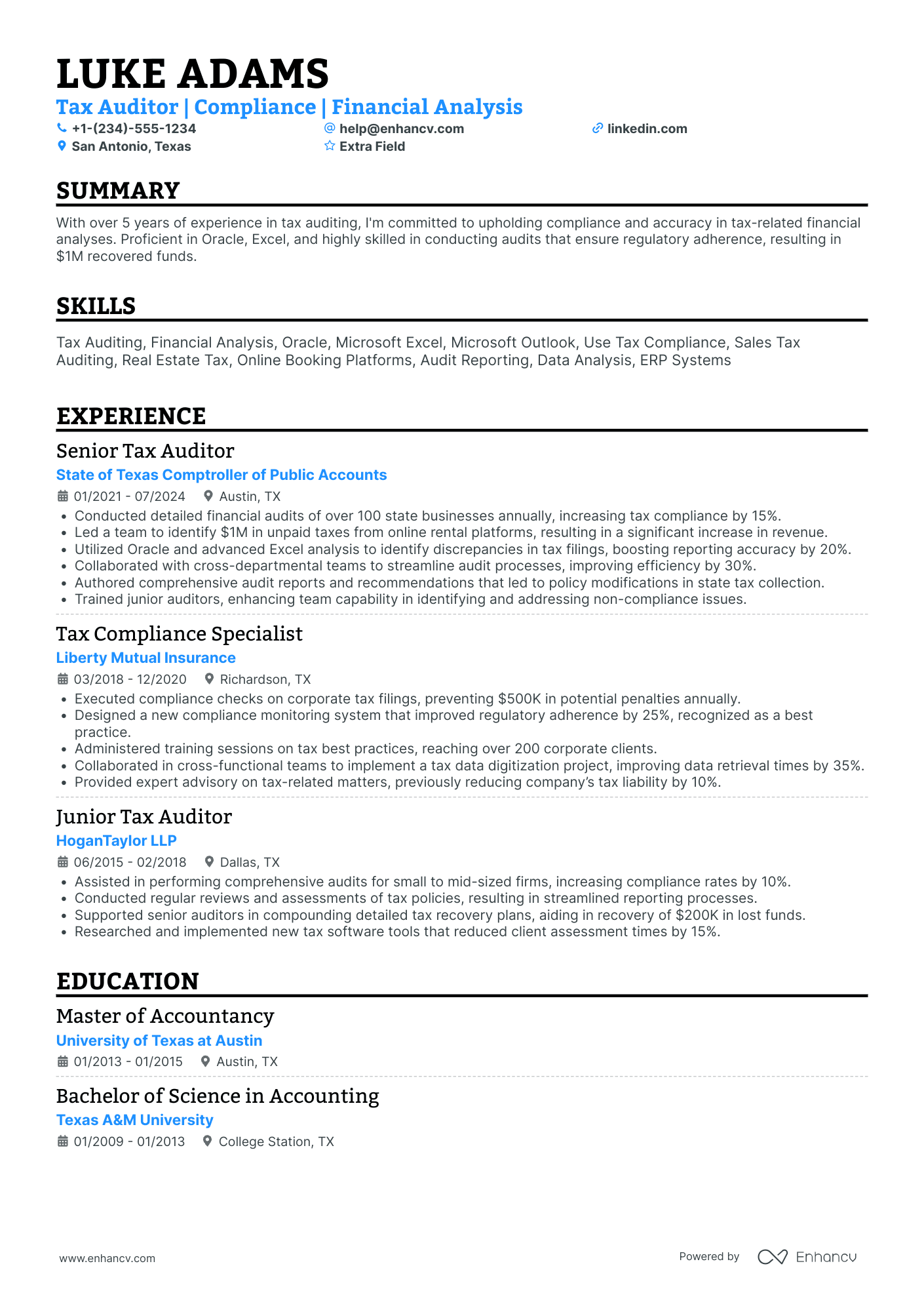Meet Alex, an accomplished auditor who has spent the last five years at PricewaterhouseCoopers. During his time there, Alex honed his skills in financial auditing, working with a diverse range of clients from small businesses to large corporations. However, Alex has always had a passion for technology, and now he’s ready to leap IT auditing.
Alex's main challenge? Тransitioning his robust financial auditing experience into a field dominated by tech-savvy professionals. He needs to build a resume that highlights his relevant skills and experience while showcasing his eagerness to embrace IT auditing.
For auditors like Alex, such a career shift is frustrating enough. The key to overcoming this challenge lies in effectively translating Alex's existing skills into the new domain. In this guide, we’ll walk you through transforming your auditor resume for a job change, just like Alex. But that's not all. We’ll also help you to:
- Keep a clean and ATS-compliant resume that presents you as a detail-oriented professional.
- Identify and highlight the right skills that will help you stand out, regardless of your career level or situation.
- Provide concrete examples of achievements to demonstrate your professional accomplishments.
- Tailor your resume to fit the unique requirements of each job you're applying for.
- Leverage certifications and continuous learning.
- Ensure your resume makes a strong impact, even if you're just starting your career.
Let’s get started.
Looking for any other finance and auditing role? Browse through our range of targeted resume guides:
- Big 4 auditor Resume Example
- Audit Manager Resume Example
- Financial auditor Resume Example
- Internal Audit Manager Resume Example
- External auditor Resume Example
- IT auditor Resume Example
- PwC Resume Example
- Deloitte Resume Example
- Personal Banker Resume Example
- Public Accounting auditor Resume Example
- CPA Resume Example
- Payroll Director Resume Example
- Auditor Cover Letter
Free text-only auditor resume sample
Mark Smyth
Internal auditor
mark.smyth@enhancv.com @LinkedIn New York, NY
Summary
Detail-oriented and results-driven auditor with over 4 years of experience in internal audit roles and business intelligence. Proven expertise in programming and SQL, coupled with a strong background in quantitative analysis. Adept at navigating ambiguity and managing multiple projects simultaneously in fast-paced environments. Certified in CISA and CPA, with excellent communication and people management skills.
Experience
Senior Internal auditor
PwC, New York, NY
June 2019 – Present
- Lead ad hoc analyses of financial and IT data to assist other areas of the audit function.
- Develop repeatable methods to ensure consistent results and help build an internal knowledge base.
- Design and executed audit programs, operational process reviews, and system implementations.
- Identified and resolved discrepancies leading to a 15% reduction in annual financial reporting errors.
Internal auditor
PwC, New York, NY
June 2015 – June 2019
- Conducted detailed audits of financial and IT systems, identifying risks and recommending improvements.
- Collaborated with cross-functional teams to create integrated system requirements and provide IT control expertise.
- Managed multiple projects and teams, ensuring timely and accurate completion of audit tasks.
- Developed and implemented process improvements, enhancing the efficiency and effectiveness of audit processes.
Education
Bachelor of Science in Business Analytics
University of New York
Graduated: May 2015
Certifications
- Certified Information Systems auditor (CISA)
- Certified Public Accountant (CPA)
- Certified Internal auditor (CIA) (if applicable)
- Certified Information Systems Security Professional (CISSP)
Skills
- Business Intelligence and Analytics
- Internal Auditing and Risk Management
- SQL and Programming
- Process Improvement and Problem Solving
- Project Management
- IT Controls Expertise
- Communication and People Management
Languages
- English (Native)
- German (Conversational)
How to format an auditor resume the right way
The best resume order for an auditor in the US is typically the reverse chronological format. It lists your work experience starting with your most recent position and working backward.
Resume design tips for auditors
Layout
- Margins and fonts:: Keep margins between 0.5 to 1 inch to ensure your resume looks clean and is easy to read. Choose professional fonts like Rubik, Lato, or Exo2, sized between 10 and 12 points for readability.
- Colors: Use a simple color scheme in black, navy, and grey. A touch of color for headings can be nice but don’t overdo it.
- Columns: Using columns can help organize information but avoid overcomplicating the layout with tables and graphs. Two columns for skills and experience can work well. Aim for one page if you have less than 10 years of experience. If you have more, two pages are acceptable. Keep it concise and relevant.
Contact information
- Resume header: List your name, job title, and email address. You don’t need to include your physical address but make sure you include your LinkedIn profile and any relevant professional website or portfolio.
- Photo: In the US, it's generally recommended not to include a photo to avoid bias.
File formatting and naming
- File format: Save your resume as a PDF to preserve formatting. Also, use a professional file name, such as “FirstNameLastNameauditor_Resume.pdf”. This makes it easy for hiring managers to identify your document.
Be aware of location-based layout differences – Canadian resumes, for instance, might differ in format.
PRO TIP
Don’t stress too much about ATS. Just make sure your resume is in a simple format without excessive graphics or unusual fonts. Use standard section headings like “Experience” and “Education” as these are easily recognized by the software. For more details, check out our extensive guidelines in the ATS Resume Guide & Examples article.
Top sections in the resume
Your auditor resume should include at least five essential sections: Summary, Work Experience, Certifications, Education, and Skills. We’ll cover each one in detail in this guide.
Already have a resume? Run it through our free resume checker, which evaluates your document across 16 crucial areas.
Is your resume good enough?
Drop your resume here or choose a file. PDF & DOCX only. Max 2MB file size.
Now that we have the structure covered, let’s move on to the most substantial part of your resume — the experience section.
How to write your auditor resume experience
As an auditor, you already understand the power of numbers, so quantifying your work successes should come naturally. This is where the experience section becomes crucial, as it showcases your professional history and demonstrates your impact in previous roles. The most important aspect here is to highlight your achievements with numbers and results as this provides recruiters with clear evidence of your skills and effectiveness.
First, however, consider the key points to include:
- Job title and company: Clearly state your position and the company you worked for.
- Location and dates of employment: Include where you worked and the duration of your employment.
- Responsibilities: Outline your core responsibilities, focusing on those relevant to the job you’re applying for.
- Achievements: Highlight your key accomplishments using quantifiable metrics.
When it comes to quantifying your achievements, using numbers makes them more concrete and impressive. It answers the "so what?" question by showing the impact of your work. Below are some examples of how to quantify your accomplishments properly:
- Use percentages: Show improvements or reductions (e.g., reduced audit discrepancies by 30%).
- Dollars and savings: Highlight financial impact (e.g., identified $200,000 in cost-saving opportunities).
- Frequency and scale: Indicate how often you performed tasks or the scope of your work (e.g., managed a team of 5 auditors).
Creating a job-winning resume, however, goes beyond facts and figures. You need to approach each application individually and tailor your resume to each job posting. A customized resume shows that you’ve taken the time to understand the job requirements and align your skills and experience with the specific needs of the employer.
We usually refer to this process as resume targeting. The benefits are indisputable. For instance, customization demonstrates your genuine interest in the position and the company, which can make a positive impression on recruiters. Furthermore, HR staff often have limited time to review each resume. A well-tailored document quickly conveys your suitability for the position.
Let’s look at a real-world job posting that Alex, our hero from the intro, is interested in. We’ll explore how to adjust an auditor’s resume experience to include keywords from the job description, ensuring it stands out to recruiters.
Senior IT auditor Job Description
About the Role:
As an IT Internal auditor, you'll be at the forefront of our IT audit initiatives and cyber and data analytics projects. You'll lead IT internal audits, collaborating with a dynamic team to ensure the highest standards of excellence.
Your Responsibilities:
- Champion workshops to identify data analytics needs, ensuring we stay at the forefront of technology.
- Planning and executing internal IT audits and assessments.
- Contribute to training programs, sharing your expertise with auditors and controllers.
- IT SOX Testing.
- Providing recommendations for improving IT controls and processes.
- Cybersecurity reviews.
Your Qualifications:
- A passion for IT Audit and Cyber security.
- A Bachelor's degree (additional qualifications a plus).
- Relevant experience in IT internal audit, Cyber or data analytics.
- Strong communication skills and a collaborative spirit.
Below is a good example of how Alex’s experience section could look if successfully tailored to the description above.
- •Contributed to training programs, sharing expertise with auditors and controllers, enhancing team proficiency by 15%.
- •Planned and executed over 50 internal IT audits and assessments, ensuring adherence to regulatory requirements.
- •Contributed to training programs, sharing expertise with auditors and controllers, enhancing team proficiency by 15%.
- •Led IT SOX testing, providing actionable recommendations that improved IT controls and processes by 25%.
- •Conducted comprehensive cybersecurity reviews, identifying and mitigating potential threats, which reduced security incidents by 30%.
So why does this work?
- Customized: The experience section uses exact keywords and phrases from the job posting, making it clear that the candidate's prior experience is directly relevant to the IT Internal auditor role.
- Quantified achievements: It includes specific numbers to showcase the candidate's impact, like a "20% increase in audit efficiency" and "reduced security incidents by 30%," which adds credibility and impressiveness.
- Clear and concise: Each bullet point is straightforward and easy to read, making it simple for hiring managers to quickly grasp the candidate's key achievements.
- Variety of responsibilities: It covers a broad range of tasks such as leading workshops, executing audits, contributing to training, and conducting cybersecurity reviews, demonstrating a well-rounded skill set.
- Demonstrates leadership: Highlights leadership roles like "championed workshops" and "led IT SOX testing," showing that the candidate is proactive and capable of taking charge.
- Professional tone: The language is professional yet approachable, striking the right balance for a resume.
How do I write an auditor resume with no experience
It’s not unusual for companies to actively seek entry-level candidates for auditing roles. Organizations often look for fresh talent who can bring new perspectives, enthusiasm, and a willingness to learn and grow within the company. Hiring entry-level employees allows companies to mold and train individuals according to their specific processes and culture.
For those aspiring to become junior auditors, crafting a resume with limited or no experience is crucial to standing out in the competitive job market.
Here are some key tips to help you create a compelling resume that highlights your potential and aligns with the needs of hiring managers:
- Use a functional or hybrid resume format: These formats emphasize skills and abilities over chronological work history, which is particularly useful if you have limited work experience. This approach helps hiring managers quickly see that you possess the necessary competencies and enthusiasm for the auditing field, even if you’re just starting out.
- Write an objective statement instead of a summary: The objective clearly outlines your career goals and highlights what you aim to achieve in the auditing field. It also communicates your enthusiasm and direction, giving hiring managers a clear understanding of your aspirations and how they align with the company's goals. Here’s a top-notch auditor resume objective you can use for inspiration:
- Highlight relevant education: Include any relevant certifications, such as CPA, CIA, or CISA, even if you are currently pursuing them. You can also mention any academic projects or case studies related to auditing or accounting.
- Emphasize soft skills: auditors need to be detail-oriented, analytical, and collaborative. Provide examples from your experience that demonstrate these skills.
- Include relevant internships or work experience: Detail your responsibilities and achievements during internships, particularly if they were in auditing, accounting, or finance. Even unrelated jobs can demonstrate skills like time management, teamwork, and responsibility.
- Showcase technical skills: Mention any experience with audit software, accounting systems, or data analytics tools such as Excel, QuickBooks, ACL, and IDEA. Basic IT knowledge can also be valuable, especially in IT auditing roles.
- Use action verbs and quantify achievements: Start bullet points with strong action verbs like assisted, analyzed, compiled, reviewed, and coordinated. This showcases diligence and initiative.
Free entry-level auditor resume template
Martha Rogers
Junior auditor
martha.rogers@enhancv.com @LinkedIn Washington, DC
Objective
Highly motivated and detail-oriented entry-level auditor with a Bachelor's degree in Accounting and hands-on experience through internship roles. Seeking to leverage my auditing and financial analysis skills in a full-time auditor position at Han Group to contribute to team success and client satisfaction.
Skills
- Knowledge of accounting standards: Familiarized with pronouncements from the Financial Accounting Standards Boards (FASB) and AICPA during academic coursework and practical applications.
- Client interaction: Gained experience in communicating with clients to enhance audit efficiency and address concerns during my internship.
- Financial statement analysis: Executed various segments of financial audits, honing skills in analyzing financial statements and identifying discrepancies.
- Organizational skills: Demonstrated excellent organizational abilities by managing multiple tasks and deadlines efficiently in a fast-paced environment.
- Proficiency in Microsoft Office: Utilized Word and Excel proficiently for preparing audit documents and reports.
- Team collaboration: Worked effectively both independently and as part of an audit team, contributing to the overall success of audit engagements.
Experience
Audit InternMarcum LLP, Washington, DC
June 2026 – August 2026
- Assisted in auditing financial statements for various clients, ensuring adherence to auditing standards and principles; contributed to audits totaling over $15 million in assets.
- Conducted segments of audits under the supervision of senior auditors, gaining hands-on experience in different types of financial statement engagements; completed 12 audit segments independently.
- Communicated effectively with clients to gather necessary information and clarify audit-related inquiries, enhancing team efficiency and reducing data collection time by 20%.
Education
Bachelor of Science in Accounting
George Washington University, Washington, DC
Graduated: May 2026
- Relevant coursework: Auditing Principles, Financial Accounting, Managerial Accounting, Business Law, Taxation
Certifications
- CPA Candidate (Passed Auditing and Attestation section, preparing for remaining sections)
- Microsoft Office Specialist: Excel Certification
Next, let’s focus on practical and interpersonal skills, which are integral to your auditing resume.
Auditor skills for your resume
As the University of Phoenix explains, both hard and soft skills are essential for auditors to effectively carry out their duties, from technical financial analysis to maintaining client relationships and ensuring accurate communication of audit findings.
So, when crafting an auditor resume, you should highlight a balanced mix of practical and people skills. Let’s go through them below:
Hard skills
Hard skills in auditing refer to the technical abilities and knowledge necessary to perform specific job functions. These include proficiency in accounting software, an understanding of financial regulations and standards such as GAAP and IFRS, and the ability to analyze financial statements.
When listing hands-on skills on a resume, place them in a dedicated section where recruiters can easily access and assess your suitability for the role. This approach also benefits ATS systems, making it easier for them to process and recognize your skills
Best hard skills for an auditor resume
- Financial statement analysis
- GAAP (Generally Accepted Accounting Principles)
- IFRS (International Financial Reporting Standards)
- Tax laws and regulations
- Internal controls assessment
- Risk assessment and management
- Audit planning and execution
- Compliance auditing
- Forensic accounting
- Accounting software (e.g., QuickBooks, SAP, Oracle)
- Data analysis tools (e.g., Excel, ACL, IDEA)
- Financial reporting
- Budgeting and forecasting
- Tax preparation software (e.g., TurboTax, Lacerte)
- Account reconciliations
- Variance analysis
- SOX (Sarbanes-Oxley Act) compliance
- Internal auditing
- External auditing
- Financial modeling
Soft skills
While hard skills ensure auditors can perform the technical aspects of their job, soft skills are crucial for achieving overall success and client satisfaction in the auditing profession.
In a resume, it’s often wiser to demonstrate soft skills through quantifiable achievements rather than merely listing them. This approach allows you to show how these skills have directly contributed to your successes and the value you bring to potential employers.
For example, instead of simply listing "communication skills," use the bullet points in your experience entries to highlight a specific achievement that demonstrates this skill in action. Like so:
“Improved audit team efficiency by 20% through clear and effective communication with clients, ensuring all necessary documents were provided promptly.”
This method provides concrete evidence of your soft skills, making your resume more compelling and credible.
Below are the most sought-after soft skills for auditors:
Best soft skills for your auditor resume
In the field of auditing, having the right skills is essential, but not enough on its own. Auditors typically need a relevant degree, with many positions requiring an MA in Accounting or a related field.
Here’s how to effectively present your educational background to demonstrate your qualifications for auditing roles.
How to list education and certifications on your resume
To pursue a career in auditing, you need a strong educational background. Most auditing jobs require a degree in Accounting, Finance, or a related field. For advanced or specialized roles, a Master’s degree in Accounting or an MBA with a focus on accounting or auditing may be needed.
Evidently, the education section on your resume should clearly communicate your academic background and highlight relevant courses to capture recruiters' interest. Here’s how you should approach it:
- List degrees chronologically: Start with your most recent degree and work backward.
- Include key details: For each degree, mention the institution, degree obtained, major, and graduation date.
- Highlight relevant coursework: Include a subsection for coursework if it’s particularly relevant to auditing.
Below is a good example of how an auditor’s resume education can look:
- •Relevant Coursework: Advanced Auditing, Financial Statement Analysis, Corporate Finance
- •Relevant Coursework: Auditing Principles, Taxation, Business Law
When it comes to certifications, it’s worth listing them in a separate section, each one along with the certifying body and date obtained. Look at the most common certificates you might want to add to your resume.
Best certifications for an auditing resume
Next, we discuss how to craft a compelling summary that will get you an interview call.
How to write your auditor resume summary
An auditor should have a resume summary because it provides a snapshot of their most relevant qualifications, skills, and experiences right at the top of the resume. Since becoming an auditor often requires prior financial or accounting experience, a summary effectively highlights these credentials, making it easier for recruiters to quickly gauge whether you’re a good fit for the role. This helps save time and makes the hiring process more efficient.
A well-crafted summary can highlight key achievements, certifications, and areas of expertise, which can set the candidate apart from others. Here’s how to write yours:
- Start with a strong opening: Begin with a brief statement that captures your professional title and years of experience.
- Highlight key skills and expertise: Mention specific skills and areas of expertise that are most relevant to the auditing role, such as proficiency in financial analysis, regulatory compliance, and risk assessment.
- Include certifications: Highlight any relevant certifications, such as CPA, CIA, or CISA.
- Mention key achievements: Briefly outline any notable achievements that demonstrate your value, such as successful audits or significant improvements in internal controls.
- Tailor to the job description: Customize the summary to align with the specific requirements and responsibilities listed in the job description.
Does the candidate below tick all the boxes?
This combination of clear professional identity, relevant skills, notable achievements, and necessary certifications makes the resume summary compelling and effective for catching a recruiter's attention.
PRO TIP
When crafting your resume summary, it's best to avoid using the first-person perspective. While it might feel natural to use "I" or "my", doing so can make your resume seem less professional. Instead, opt for a more polished, third-person style.
Why? First, resumes are understood to be about you. Second, a third-person approach keeps the content focused on your skills and accomplishments, making it more impactful and easier for recruiters to scan quickly.
Optimize your resume summary and objective for ATS
Drop your resume here or choose a file.
PDF & DOCX only. Max 2MB file size.
Additional sections for an auditor’s resume
In addition to the standard ones, several other sections can help your resume stand out and demonstrate your qualifications and expertise as an auditor. Here are some of the best additional sections to include:
- Professional affiliations: Include memberships in professional organizations such as the Institute of Internal auditors (IIA) or the American Institute of CPAs (AICPA). This shows your involvement in the professional community and ongoing commitment to staying current in your field.
- Continuing education: Detail any courses, workshops, or seminars you’ve attended that are relevant to auditing. This demonstrates your dedication to professional development and staying up-to-date with industry trends and standards.
- Projects: Provide examples of specific projects you’ve worked on, including details about the scope, your role, and the outcomes. This can give recruiters a clear idea of your hands-on experience and problem-solving abilities.
- Languages: If you are proficient in multiple languages, this can be a valuable asset, especially if you’re applying to firms with international clients.
- Awards and honors: Mention any awards or honors you have received related to your academic or professional achievements. This can set you apart as a high-achiever in your field.
- Volunteer experience: Include any volunteer work that is relevant to auditing or demonstrates transferable skills such as leadership, project management, or community involvement. Volunteer experience can also show your character and commitment to giving back.
PRO TIP
Use Enhancv’s resume builder to create and rearrange extra sections on your resume with a few clicks. This approach allows you to store multiple resumes on your account, each tailored to the specific job you’re targeting.
By incorporating these additional sections, you can create a more comprehensive and impressive resume that sets you apart from other candidates.
Key takeaways
Just like a meticulous audit ensures financial accuracy, a well-crafted resume ensures you make a strong impression on recruiters. As you build or refine your auditor resume, remember these key takeaways:
- Showcase relevant experience: It’s important to use quantified achievements to demonstrate your impact. Tailor your experience section to match the job description.
- Highlight key skills: Include both hard and soft skills, but not all of them. Pay attention to those that are specifically relevant to the job.
- Ensure a strong educational background: List your degrees chronologically, including relevant coursework. Remember to emphasize any advanced degrees and professional certifications like CPA, CIA, or CISA.
- Craft a clear and impactful resume summary: It should highlight your most relevant qualifications, skills, and experiences.
- Include additional sections: If space allows, you can add optional resume sections to enhance your resume.
Auditor resume examples
By Experience
By Role
